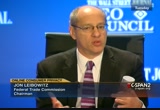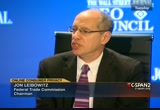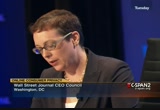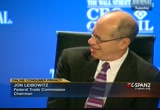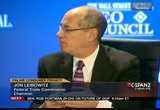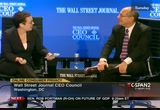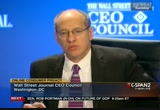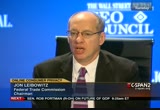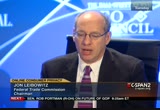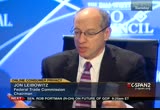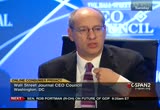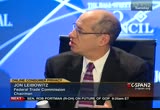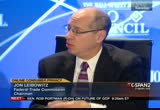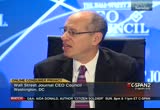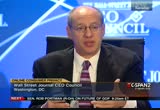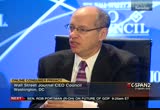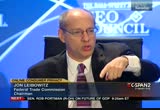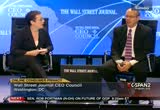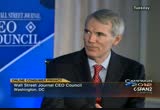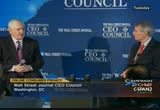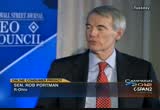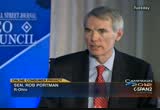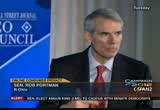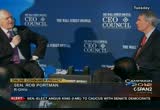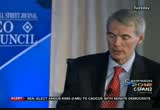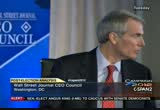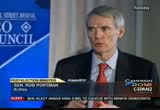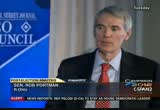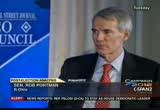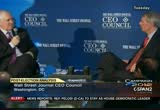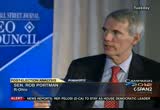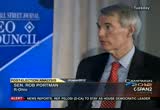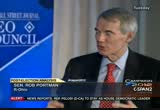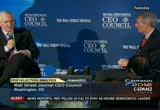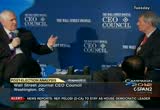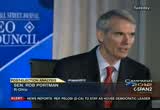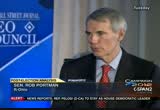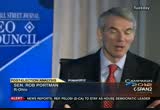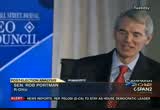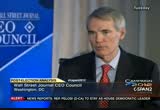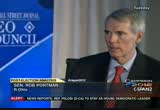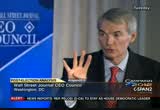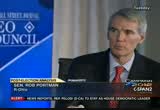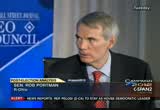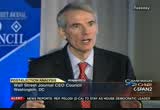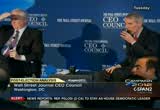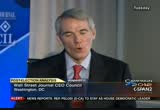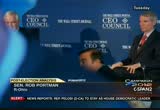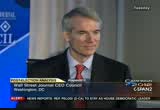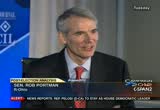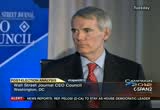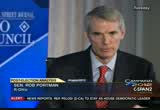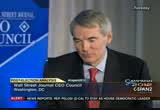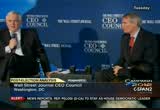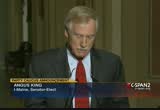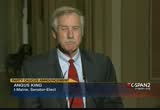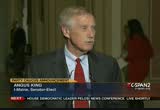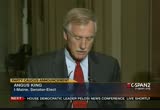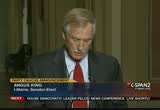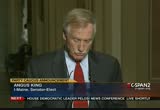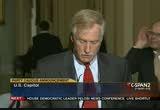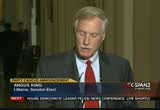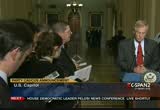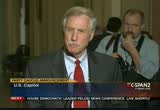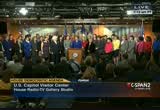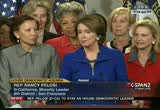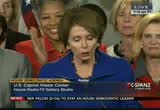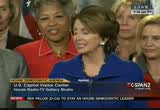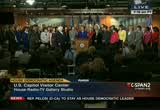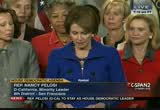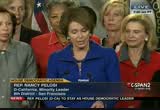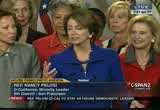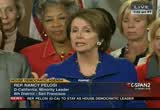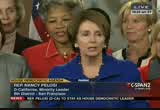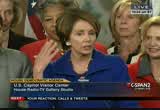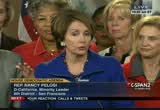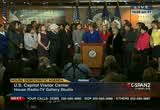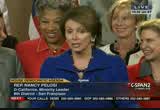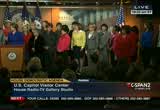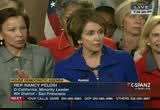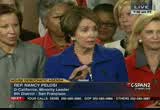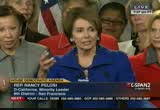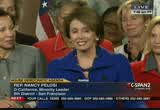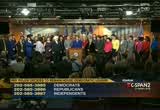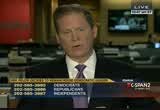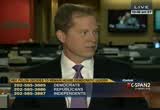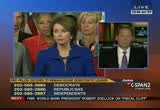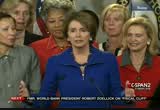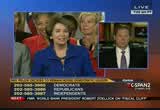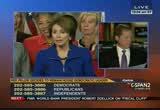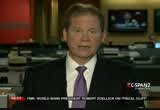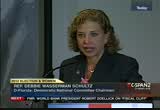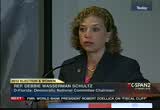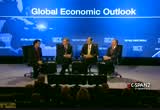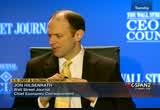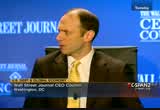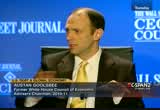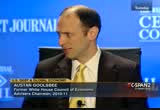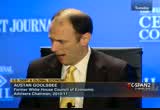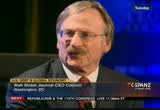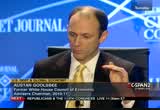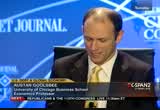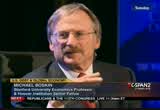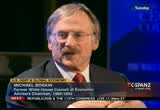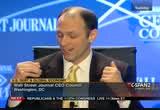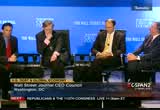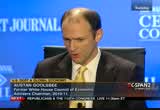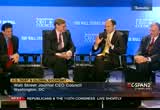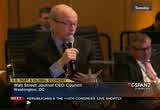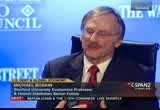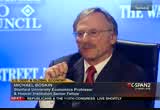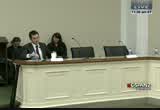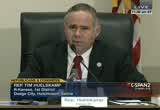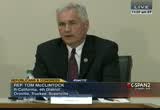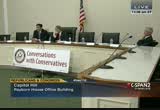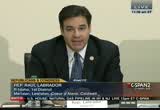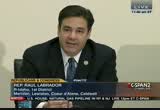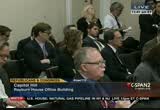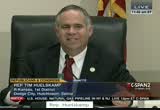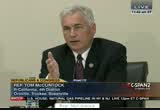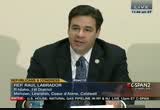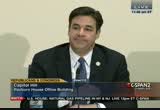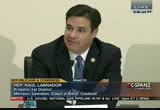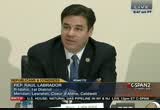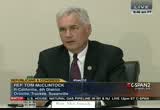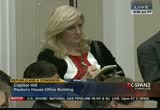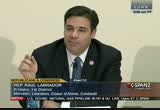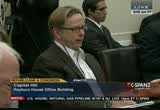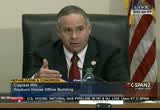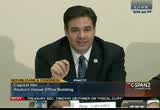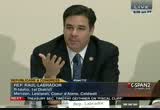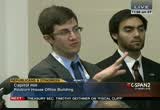tv U.S. Senate CSPAN November 14, 2012 9:00am-12:00pm EST
9:00 am
over where their data goes, will really risk i think a legislative backlash which will be much more prescriptive next you. we're not going to read it, we are not obligatory agency and sets in a few areas involving children. and so i think that's a decision for industry to make, but i think the trend lines have been good because we are seeing -- when we proposed the notion of to not track probably two years ago, when we finalize our privacy report, and last december, almost a year ago, i don't think anyone thought we would get this far. ..
9:02 am
parental consent for the use of tracking, you know, of children, on behavior. which is actually difficult to implement. and a lot of industry has been very vocal about, concerns about this. i just wanted to check where that stands. is that also going to be done by the end of the year? >> that is something fortunately we have some control over. it is an update the childrens online privacy protection act. it is rule making and we're looking at all the comments that came in and sort of weighing, weighing how to tweak the regulation and we'll finish it up by the end of the year i'm pretty sure.
9:03 am
julia, i don't think it is as controversial as you suggested. >> everything is controversial in my view. that is what is so interesting. one of the most compelling criticisms i heard of cop pa -- copa. it disincentivizes children's cone tent because he have to get consent. as a parent i don't feel there are november places where i can feel safe for my children going online. what do you have to say for that argument? >> look, i would say, we're talking first of all, we're talking about very vulnerable population. children online privacy protection act sites involve children that are 12 years old and younger. i think we want to make sure we protect their privacy. the only kind of privacy we, the way which we do that for the most part by requiring
9:04 am
parental consent before you a join a copa compliance site. seems to me a pretty basic proposition and i don't think it has, certainly there are some people who want to be able to mine the data of children without parental consent. they're entitled to have their views and they're entitled to stir up a little bit of controversy and the nature of the political process in washington. for the most part, people, companies, companies that target young children, sort of, and bring them wonderful benefits would say that copa actually unleashed a lot of innovation. innovation towards young children and also set the right parameters of balance to make sure we protect kids online. >> well it comes down to the protection which is sort of the fundamental question of all of these things which is sort of what is the right price to pay for free content? obviously we at "the wall street journal" of actually paying for your content. >> right. >> this is sort of the fundamental question of the
9:05 am
internet economy. >> right, it certainly is and again, no one, even in the children, even in the copa context where we proposed before you collect information online from children you have to get parental consent, we don't think, i mean that doesn't stop advertisements for children. it only stops particularly types of information and advertising it back and monetizing that information and soling it to third parties and using it to advertise to children. all it doesn't say you can't collect certain types of information. that is our proposal. we are taking comments. we haven't made up our mind precisely where we're going to go. >> let's sort of talk broadly about a concept of unfairness. so the ftc has a mandate of enforcing deceptive and unfair practices right? >> right. >> traditionally you erred on the side of deceptive. >> well, you know, if you make a commitment to anyone in this room we will in the
9:06 am
privacy content we will protect your data and you don't honor that commitment that is deceptive practice. that is an easy thing to understand conceptually. >> unfairness is a little harder to understand. one. commissioners talked extensively about his concerns about using unfairness as a standard. he said it is an elastic and elous a sieve concept and you -- elusive concept but i would say it is fair that you guys are expanding the use of unfairness in your cases. >> very often with commissioner rush's vote because he is a big believer in using unfairness in the right context. again, some things, let me give you an example what could be an unfair practice. even if you, we all understand if someone says i will honor, we will keep your information private and then the information becomes public that that's a violation of deception. but, for example, what happens if a company says,
9:07 am
what happens if a company has inadequate data practices and someone can, or inadequate data security and someone can tap in, hack their computer system and take your, take your energy? that is -- information. that is example of unfairness. we brought 100 examples of spam cases many based on unfairness. 40 data security cases using unfairness. those are examples where i think you want us to use this statute. this is a statute that congress gave us in 1939 to prohibit unfair deceptive acts or practices. >> wyndham case is fair example. it didn't protect their credit card data. >> what we allege, yes. >> 500,000 credit card numbers ended up in the hands of a russian company. >> can neither confirm or deny that. that is certainly the allegation. i don't think even they deny it. >> i guess you brought that.
9:08 am
>> involving multiple hacks. not first time or second time. perhaps as many as three. >> one thing i wonder about, one criticism of the ftc you didn't do anything to google for their overcollection of wi-fi information and i don't know how much you can say about that by that, part of the problem there was they didn't say they wouldn't do it. so it wasn't deceptive. they never said i'm not going to collect everybody's information over wi-fi. >> so you can't say much about investigations except that we try to be balanced. not every allegation of unfairness by competitor or by consumer group necessarily happens, necessarily is accurate. and so in the case of google, i mean, which we have under order for a privacy violation. then they violated that order, in this instance we just didn't think that it met the test for either unfairness or deception and, you know, we have actually,
9:09 am
one of the things that we are most proud of is our, one is the privacy case against google and also the privacy case against facebook the privacy face involving facebook used both deception and unfairness and it has, as a result of that it protects the privacy of more than a billion consumers worldwide and i know you want to talk at some point about the european regulation and one of the things that, and the europeans already scoff at american jurisprudence and american law. we don't have an overarching privacy law. when we point out that we've, that, if facebook changes its privacy policies going forward they have to give an opt into more than several hundred million european consumers that is sort of an ah-ha moment for them. >> right. >> you know? in fact using this very, sort of broad or statute that prohibits unfairness
9:10 am
and we have to go to court to prove it, right? we can't just say it's unfair and sanction a company with a fine. that's sort of actually kind of works to protect privacy and we try to do it in a balanced way and in a bipartisan way. >> right. we're mentioning that you did get the largest fine of from google, 22.5 million. >> look for google it's a small amount of money. for us it was a big fine. it also allows google to go forward doing the wonderful thing it does for american consumers. again, we're not, for people who know us, you know we're not really an agency that is in the business of sanctioning companies just because we can and we want to make sure that the internet ecosystem goes forward but that was a big fine for us, yes, absolutely. >> do you get the sense that is changed behavior of companies, as i see these set of fines? >> we can only fine a company if we have them under order.
9:11 am
we may use cease and desist orders and ask them to monitor for a while. look, i think the notion that the ftc is engaged here in a fair and balanced way but if you violate the law we're going to come after you i think is a fairly meaningful one and we like to think that we are a cop on the beat protecting privacy but also, you know, in our privacy report which you're aware of which called for, which called for more privacy by design, when you're designing those cool new apps make sure you build in privacy protections more choice, and more transparency we worked with all the companies and i think the aspirationally they all agree we came out with sort of a pamphlet or a report that has best practices and a lot of companies are moving towards. >> right. move onto the e.u. as you mentioned. they have a very different approach to privacy. >> yes, they do. >> which is sort of holistic law basically covering all
9:12 am
types of data and so there's been a lot of concern whether we're going to sort of move in that direction. whether there is going to be some harmonization where we have to come up to a certain level and they have to come down. what is your view where that stands right now? >> well in the antitrust world as you know there has been a lot of convergence between the e.u. and the united states. they take a much less, somewhat less prescriptive approach than they once did and i think we see a lot of convergeance around the world. with respect to the privacy they proposed a regulation that would take effect that would be i think much more prescriptive than the american approach. again the american approach is you go after violators and try to articulate best practices. our sense, my sense you will see a little more convergence. you might see that european proposed regulation becoming a little bit, moving a little bit more to our approach of allowing some advertising and allowing some collection of
9:13 am
information. again we don't think that is necessarily a bad idea and you want to have the benefits of, of behavioral marketing and benefit of some type of collection. and that seems to be the direction that the your peebs -- europeans are going. this has to go through multiple additional votes and vetting through the european parliament. so we'll see how it turns out but we're, but we are, you know, fairly involved in aware of what is going on i would say. >> now you guys have also talked about how you might be heading towards regulating data brokers and move into that area. i think you had a case or two this year where you used the fair credit reporting act. >> sure. >> so that is sort of nucialt -- unusual, maybe not unusual but it is an interesting approach, right?
9:14 am
because the fair credit reporting act a lot think very much about your credit score and in fact you're using it for slightly wider variety of things. i would love to hear your thoughts on that. >> well the fair credit reporting act when you're making, when a company makes decisions with information based on your, gives out your credit history and for, you know, job applicants there are certain procedures they have to go through to give consumers right to correct inaccuracies. sort of fundamentally, it is a basic proposition of what the law does. some data brokers have been sort of edging into the credit reporting status and that's how we brought our cases. again, you know, look, there is nothing wrong with certain types of information collection, particularly on first party sites. even on third party sites. all we call for is opt out. but credit brokers are entities that consumers have no relationship with whatsoever. they collect this information about you. they monetizing it.
9:15 am
theying a great it. they do all sorts of things with it. it might not be accurate. it might not be the kind of information you want collected. we would not regulate but what we called for congress to give consumers at least a modest degree, this is unanimous position of the commission, for congress to give consumers a modest ability to correct inaccurate information and when we made this proposal as part of our privacy report initially some of the data brokers thought that it wasn't unreasonable which is always a good sign. they have since backed off of that position but look, i think most industries, most companies, the people in this room and you should disabuse me of this, we're all off the record, i hope, and disabuse me. >> we're not. >> we're not off the record. disabuse me of the notion. on the record you could disabuse me of notion i'm wrong. most of you in this room and your companies want to be on
9:16 am
the side of consumers. you recognize there is a need to strike a balance particularly in some areas, particularly involving kids. >> question? >> alan murray, yes, sir. >> so the title of this session was big data opportunity and risk i feel like we spent the last 20 minutes talking about the risks. >> sure. >> the privacy risks. the risks to children. the cybersecurity. could you spend a little time talking about the opportunity. i mean we have several health care ceo's in this audience. what it might mean to time to market for drugs or access to information if you're in a automobile accident in the middle of nowhere. all the ways which big data creates economic and social opportunities. >> it does and i think it is really important to understand that. it can create, big data can create efficiencies. it can create for businesses. it can create sort of a better decisions and quicker and faster and cheaper decisions in the health care area. it can actually allow the kind of targeted advertising
9:17 am
more generally back to consumers that, that most consumers including, that i certainly think is beneficial. and so we are always very, very mindful of the benefits of big data and that's a very sort of good point to make. >> more questions? >> yes, sir? >> do you think you should have done something about the privacy earlier? i'm thinking particularly the decision over doubleclick we must be about four or five years ago. >> five years ago. 2007. >> when there was considerable comment and controversy whether you should have done something about it then? >> well, that is a fair point. now we can't, i mean we try to, we try to have a church-state separation of our competition and our consumer protection issues in the sense that we can't take a privacy remedy, you know, while we're doing a merger review. the merger statute for us says, block the deal if it
9:18 am
may substantially lessen competition and we were aware of privacy concerns at the time but if you, you get into a little bit of trouble if you start to take privacy remedies on an antitrust review and so i hear what you're saying and certainly that's a, reasonable people can disagree but i think, i think we did the right thing on google doubleclick and on google ad mob where we poised to block the deal actually until apple bought a competitor and we sort of recognized that the competition was going to be from device to device over mobile advertising. it wasn't going to be within devices. yes, sir, did you have a question? you did not have a question? oh, you looked like you might. other questions? can i make one point on health care by the way? two points actually. one point on health care. i know you're breaking up into health, into different groups. one of which is health care.
9:19 am
we have a case that i believe the supreme court will sick scert on this month or the month after. this will be through the congressional process and will be discussed if it is a grand bargain. it was discussed last summer a year ago summer, which involves what we call pay for delay pharmaceutical settlements. it is where the brands put a big bag figuratively of cash on the table to generics, stay out of the marketplace for a few years and you will get more money by not competing than competing. the courts are split on this and we think it would be terrific if the supreme court takes this case and resolve it because that's what they're supposed to do. our bureau of economics estimates that if, that if woe, if these deals are restricted, it will save american businesses 3 1/2 billion dollars a year in health care costs and it will save the federal government according to cbo
9:20 am
about $5 billion over 10 years because they, because the federal government buys a lot of drugs. i don't know if he is in the audience today, dan vassella is one of the people participating. novartis is terrific company. they haven't done these type of deals. most pharmaceutical companies don't and they're actually at a competitive disadvantage. one of the things you might think about. one. few ways actually, when we hopefully pull ourselves back from the fiscal precipice we're going to do it. mostly by cutting benefits and raising revenues. this is one of the few areas where you don't have to do either. all you have to do is stop, you know, this win-win practice for a few pharmaceutical companies which is loose lose-lose for consumers. >> i think we have more insurance companies than we have pharmaceutical companies here today. >> that is why so many people are nodding in the audience. >> george or george, or mark, if one of you want to respond? >> [inaudible]. >> i'm right?
9:21 am
thank you. we're a government agency. sometimes does the right thing. we're also, and as al knows and julia knows, in an area, in a world of mostly dysfunctional washington i've been here in washington for 25 years, you know, we're an agency that actually does things that, you know, that is, that are bipartisan and that are generally not always right but are generally, and we are generally trying to find consensus and we're always trying to work with the business community and there is particularly difficult mermer we're in the process of finishing up and 20 members of our staff were in saturday, sunday and monday to just try to resolve it. so we actually, we actually are, you know, it is not a -- for all of us so. >> anymore questions? >> anymore questions? >> i mean my question, in a room like this what would you advise people about dealing with big data?
9:22 am
everyone here is dealing with different types of data. the truth is a lot of these risks that emerge are, most companies end up feeling little blind sided. >> sure. >> so if there is some guiding principles that you think are helpful? >> i mean now look. i think you always want to give consumers notice so they can make their own choices. i think, you know, you guys, you know, in a variety of contexts, you know, captains of industry, leaders of companies, always, you know, apply common sense and if you apply common sense you will never get into trouble with the ftc because you will usually be telling consumers what you're doing and they will be getting benefits from the use of big data. all of that is really good. nobody wants to stop that. to the extent, i see a couple of people who we have had, whose companies we've been engaged in on privacy matters, as you probably know you can always come in and talk to us. we're not in the, again, we're not in the business of sanctioning companies just
9:23 am
for the business just because we can but we what we really want to do is sort of work through problems with you. that is the right way to proceed i like to think and i like to think we do in bipartisan way which i said eight times so i will stop. >> great. thank you very much. >> thank you. and we're 58 seconds under. [applause] >> "the wall street journal" ceo council annual meeting also heard from republican senator robb portman of ohio. his comments on the election and the future of the gop are a little more than a half hour. >> senator robb portman of ohio. he is, he is a first-term senator from ohio but before that he served seven terms i
9:24 am
believe in the house of representatives before he was import tuned by president bush. >> nice way to put it. >> a couple of jobs thankless jobs, including white house budget director and united states trade representative. and of course most of you know that he served as sparring partner, debate prep leader for mitt romney in the recent, in the recent campaign and led to that what was arguably governor romney's finest moment in the campaign. the first debate. so thank you very much for being here. our title today is, the future of the republican party. this assumes of course it has one. [laughter] and let's start by talking about the election because you played obviously a crucial role in ohio. and i want to get your sense
9:25 am
of, we're now seeing reports that, you want me to use this? we're now seeing reports that the campaign was very surprised by the outcome, even right up to the evening of election day, because their polls were showing something different. your polls were showing something different than anybody else? is that true? and how surprised was the campaign? >> well, first it was a very close election in ohio and ohio was one of key states, even if we won ohio, turns out the electoral vote count would have gone to president obama. we lost by two points in ohio. recall back in 2004 when john kerry lost to george bush he would often say both publicly and to me on the floor of the senate, but for half the people that could fit in the ohio state stadium called the horseshoe i would be president today. it was a very narrow victory. i do think there were some reasons that are almost
9:26 am
technical that some of you understand well. there are some folks here from silicon valley who are very good at social media and their turnout efforts, the democrats, were quite effective. if you look at the numbers, after the fact, the turnout for democrats among their base was better than we expected. i would say better than they expected based on their polling and their sampling. so, you know, they did a better job than we did getting their voters to the polls. mitt romney got fewer votes than john mccain in ohio and still came within two points. the technology included so-called orca system. some of you maybe read about that in the last couple days which was the republican get-out-the-vote technology to insure that we were targeting people getting to the polls. it imploded on election day. it got so many hits from around the country as it should have saying gee this person voted. this person didn't vote.
9:27 am
target calls. we thought it was under attack and closed down. so for those of you here from, again, the technology field and with interest in politics, we republicans want to talk to you. [laughter] we need some help. the democrats system i think is called gorton was quite effective at microtargeting. i heard a lot of anecdotes. i heard one this morning that you will love. someone gets a call a democrat in law school. gee, we see you voted. by the way this information is publicly voted. it is at 2:00 on election, but your sister at tulane has not voted, could you call her? that east the level which they were dealing we frankly were flying blind at that point. part of it is technology. that led to a turnout evident that was very pressed on their side in the end makes the difference increase in turnout among
9:28 am
the base, democratic party is that two point difference. second, paul, you and i talked about this, i do think as republicans we were not able to take our message, which was the right message in a year when the economy was not doing well and most people were looking for change and take it to the level that people thought it made a difference in their lives for themselves and their families and this something, folks in this room are either nonmart sawn or democrats or republicans but i hope you can all agree there are certain things we should do in our economy that are growth oriented, including tax reform, regulatory relief and energy policies that we were talking about in this campaign but i think we had difficulty independent voters not republican or democrat. there is not turnout issue this is more dealing with independent voters in the middle enable to convince them this will make a
9:29 am
difference in their lives. >> on that point what was the failure there? clearly that had to be one of the core focuses on the campaign to reach those people with that message. was that a function of misguided strategy on the campaign or a failure to put it, articulate it in the right way by the candidate or the overall campaign? >> i think it is both. let me add the third element and get back to that. the third element we were outspent and particularly outspent early on. although there were not adequate resources to address every issue, some issues were allowed to remain unaddressed and those came back to hurt us in the end because in may, june, july, august, we were outspent in ohio three to one, campaign to campaign. yes some super pacs came in but even there it was more than two to one. if you're watching tv in columbus, ohio, during that time period you were seeing a lot of negative ads. they were almost all negative. they were quite effective. they were about bain and they were about the auto industry bailout and they
9:30 am
were about policy proposals that were mischaracterizing that romney's policy proposals but they were pretty effective. >> raise taxes on -- >> raise taxes on the middle class, for instance. we can't forget it was not a level playing field until really the very end. even after the convention when the general election funds were available to mitt romney which he needed to be able to try to respond we were still not on all markets in ohio. we were still being outspent. so that has a cumulative effect. it is difficult, i chaired the effort in ohio so i'm maybe too focused on ohio i think you find the same thing is true in the other swing states. it is tough to come back from that. back to your question how do you take these policies issues and translate them the way people care about, i do think it is a huge challenge for us. i would suggest a lot of people in this room share that same challenge. to the extent, forgetting partisanship here, that you believe in policies that lead to more economic growth and more jobs i think sometimes you will find among your own employees it
9:31 am
is tough to communicate it. i'm a former trade representative so i will use trade as an example. i would suggest many of you depend on global trade and, in fact one of my lunch partners talked about the revenues that his company gets from global strayed -- trade, for most fortune 200 companies, majority of our revenues are coming from overseas and many employees in those same businesses are very fearful of trade and fearful opening new markets and having trade agreements much less dealing with more complicated issues in trade. that is an example. we share the challenge. how do you explain to people, hey, this matters to you? i will put my partisan hat on and say even during this fiscal cliff conversation, you know, if we're talking about raising taxes on folks who make over a certain amount, you're necessarily bringing in obviously a lot of small businesses, entrepreneurs because pas pass-through entities a reality to our system and how do you explain that to people? may not affect many people in this room in terms of
9:32 am
your businesses because most of you are c corp.s but it affects your businesses and economy in general you care about. how do you explain that to folks in a way they understand it affects them and their families? a lot of discussion about the hispanic vote, african-american vote i agree with a lot of that discussion. but part of the larger issue when you get less than 8% of the african-american vote, less than 30% of the hispanic vote you have great opportunity. >> that is one way of putting it. >> how you look in terms of market share. because, look, a lot of people who are african-american, are hispanic, share all those beliefs that i was just explaining in terms of economic growth. most are small business people or work for a small business. you know, there is great opportunity for us to explain this in a way that is more accessible to people, that is more inclusive and so, i view that as opportunity actually. but we were not successful
9:33 am
in doing that in 2012. >> just to pursue the minority question, it is not only a share of the hispanic vote the republicans share at the presidential level has fallen for three cycles in a row, from 44 to president bush to 27. also share of asian vote from 42 in 2004 to 26 this time. what is it that, i mean what's your diagnosis of that? is immigration actually an issue, a threshold issue here, that the party needs to change on, for example? or is it, is it the size of government question where these folks are looking for government to play a more active role? >> paul, if you look at exit polling i don't think it is size of government issue, i really don't. i mentioned that earlier in terms of the hispanic and african-american voters who care about small businesses and growth. they're looking for a
9:34 am
constructive relationship with government and you know, i'm not saying that they're anti-government but it is not, they're looking for government to solve their problems. this is still a center-right country. at least the way people identify themselves but i do think there was a translation problem here literally and figurativelily by not having more spanish language advertisements and other ways to do outreach in the hispanic community. but just to say, this is an inclusive party. this is, these are policies we're talking about do affect you and your family. it is not about wall street. it is about main street. nothing against wall street but it is about our economy in general of the so i think, again, i think there is great opportunity here. in terms of hispanic voters and probably this drop-off in the asian vote, immigration is part of it. that is policy issue. that needs to be addressed but that is just part of it. it is also about who the spokespeople are. >> your convention was simply loaded with minority and women spokesmen across,
9:35 am
every evening was loaded with them. >> yeah. >> mean -- >> not many people watched it to be honest. people say natural disaster stuff play ad big role in this election. shortening the convention in tampa and then sandy at the end probably did have an impact. i don't know that, it is easy to measure that impact but paul and i talked about, among the voters who decided at the last minute, voters who decided in the last seven days, barack obama actually won a majority, which was a huge surprise to political scientists around the country who will tell you where you have incumbent and challenger, the challenger picks up the majority of last-minnesotaers and so-called undecided voters because they're not happy with the status quo but they wait until the end to decide. in this case they actually broke for the incumbent. sandy probably had something to do with that. but look, i think, it's a matter of policy. it's a matter of outreach
9:36 am
and having right people speaking for the republican party. finally it is a matter of tone. i think again making people feel that this is not just an inclusive party. forget the party. these policies are inclusive. the way to grow this economy and create more jobs an opportunity for everybody is to have policies enunsy eighted in five-point plan mitt romney laid out and we were not successful getting it to that level. >> do you think the comments by the senator, senatorial candidates, todd akin and richard mourdock mattered? did they carry through in national level in polling for republicans broadly? >> yes. again, hard to measure but obviously the gender gap that we have on our side, which by the way persists. it is not something new this year. final numbers i think are not in yet but will probably be comparable to 2008. i'm not saying it is growing but it is a challenge we face as republicans. i think those comments
9:37 am
exacerbated that gender gap. >> that's extraordinary when you think about it, in previous cycles before the persistent 24/7 media a comment by a senator would not have echoed through the national -- >> so whatever stupid things you say today can actually have an impact on what happens, every gathering, every fund-raiser as we saw, you know, everything is now subject to being repeated on the web and controversial comments spread like wildfire. that is something that candidates need to be aware of. frankly in 2014 where republicans have another opportunity on the senate side because there are, let's see, 20 democrats up for re-election and i think 10 republicans, you know we have another opportunity here. clearly just based on the numbers, to try to obtain a majority, to be able to pass budgets and do what is called reconciliation to get entitlement reform. we have to have candidates don't just have the right
9:38 am
policy positions but are aware of the fact that, you know, these kinds of comments, you know, can determine not just their election but affect the national scene. certainly saw that with regard to the missouri comments. >> are you running for the republican senatorial campaign committee chair? that is tomorrow, right? >> no. i'm more focused on the policy side right now. i really think our country is it in trouble. i know there are a lot of smart people in this room who are perhaps closer than i am to how you're going to react to what we do here in washington. certainly you will talk a lot about that during this conference but i think the focus right now has to be dealing with this fiscal cliff and putting a competitive agenda in place for our country. if we don't do that, i believe that we will not be able to get the kind of economic recovery that we all hope for and we have been being laing over the last few years. >> let me ask another question because i want to get to the agenda i want to
9:39 am
address at least one more question about the campaign and republican coalition. and that is young people. a lot of discussion in the press the last, the last week or so that you didn't make as enroads as you thought you would among voters under 29 despite the fact a lot of them are living at home and there is not a great job market for them and the president still won about 60% of that vote. is this partly a cultural issue, message? is gay marriage, for example, one of those threshold issues now that makes the republican party look out of touch with those voters and you have to change that do you think the way republicans talk about that issue? >> yeah. [laughter] >> that is very big concession because a lot of your colleagues would say, would disagree with that, and say, no, it was a close election. two percentage points. their turnout was better. we don't need to change a
9:40 am
thing? >> it was a close election as i started off with. that is something we need to keep in mind. every time an election is won or loss, ojai gosh that is end of the republican party or democratic party. it was close election. turnout issue was technical issue and can explain results in ohio, florida and perhaps virginia. it was a close election. but reality is, a party that gets less than 8% of the african-american vote and less than 30% of the hispanic vote and less than 40% of the vote of those people who are coming up through the system, you know is a party that needs to adjust and i have talked about some of that today. some of it is policy. a lot of it is tone. a lot is more inclusive message figuring out what i think is our strength, our positions on the economy and growth and opportunity and translating that in a way that young people in this case, understand and appreciate. you're getting out of school. you're looking at a 50%
9:41 am
unemployment rate in terms of matching your degree to the job you want. you would think that would be a big issue. you would think debt and deficit is big issue. it is $55,000 for every young person getting out of college and all of us and those issues are ones that we were not able to communicate in a way that was effective clearly to win the majority of that vote. i they have some of the social issues are very important to that generation. they look at these issues differently than our generation. paul and i graduated almost the same year, from the same institution and, you know, it's a different attitude now. i think you have to acknowledge that and deal with it. >> does the president have a mandate to raise taxes? and i ask because your minority leader, you're leader in the senate, mitch mcconnell told my colleague steve moore, says he does not believe that is his mandate. >> look. as you know i'm a fierce advocate for tax reform for
9:42 am
all the reasons we talked about earlier. competitiveness. america is falling behind in terms of our competentive position and one of the main reasons is our tax system is antiquated. it is inefficient. there are ways to fix it. every other country in the world by the way, oecd countries, have transformed, reformed, lower the rates. think about it. we haven't touched it since ronald reagan really. in 1986. bill clinton did raise the rate one point but we haven't done anything to touch our rate and reform our code. every other country, all of them have. taxes gone from 16% to 15%. you do business there. this flow of capital will follow countries that have more competitive environment and taxes are one of them. yes, we have to reform the tax code. when you do that, i will get more revenue. it is guaranteed. again, sort of as i was talking about earlier.
9:43 am
this is opportunities here. this is opportunity for us as a country. if you look at the congressional budget analysis and joint tax committee analysis, what tax reform could mean in terms of macroeconomic impact and growth, all will lead to more growth, whether corporate tax reform or individual tax reform. >> right but if the president insists as he did last friday, this was fought over in the campaign and, fought over tax rates, rising tax rates, he didn't ice the words rates himself but jay carney, the white house press secretary said the president will veto any bill that extends the current tax rates. if he insists that tax rates go up for those making over $250,000, what's, what would your recommendation be to the republican congress and senate? >> first having worked in two white houses i believe a president does have a veto over the press secretary. thank goodness because i like the president's comments, like the president's comments better than jay carney's comments.
9:44 am
think jay carney was maybe a little behind the curve on that, i hope because look, it makes no sense whatsoever to take our existing infish encode we talked about and add more layers on top of this to create disincentive for small businesses to invest and create jobs. i have to tell you. i would be very concerned about that. i'm a huge advocate of tax reform. what does that mean? that does mean meanwhile you lower rates you do things in terms of preferences in the code. this is deductions and credits and exemptions that makes our code more competitive. that allocates resources more efficiently. economists right, left, center, i'm looking at one right now, agree our current code is inefficient. center, thank you. it is a great opportunity for us and that's where we ought to be headed but for us to say no, what we'll do take the current code, ossified code and antiquated code and lob on taxes on top
9:45 am
of it when roughly 50%. that income is paid by pass through entity, will i add more people as the economy is going a little life? plant, equipment, am i going to make that investment, take that risk? or am i going to pay more to uncle sam. that is how these companies work. i'm investor. i'm a small business owner myself. i group grew up in a company like that. i hope the president sees this past week talks about us losing 3 million jobs last year if we don't fix the fiscal cliff, 3.4 million to be exact. analysis of ernst & young, one provision on two top rates is 700,000 rates lost. as he said economy stronger than it was now, economic growth numbers are stronger than they are now, this makes no sense, why would we want to do that. >> because white house economists don't believe tax rates matters in way you just said. >> it clearly matters. there is honest debate how
9:46 am
much they matter compared to other things but if your goal is deficit reduction which i love, and as you know i'm a proponent of it. i pros pod the balanced budget when i was omb director, five-year balanced budget. if you believe in that, if you look what this tax increase would do to the economy versus its impact on the deficit it is kind of hard to argue this makes sense economically. i'm not saying that we won't end up with this discussion and this debate and who knows at the end of the year what happens, this calendar year but i'm very hopeful we'll look at this honestly if you raise taxes on small business entrepreneurs and a lot of folks earn top rate it is less than 10% of our deficit. so it doesn't close the gap much. less than 10%. when you hear people talk about it, keep that in mind. in terms of sure us mr.s and deficits we ended up with over the last decade by the way, when you heard people say it was the bush tax cuts of 2001 that caused these huge deficits, 4%, that is the cbo number, not mine.
9:47 am
it caused 4% of it. even if you assume there was no economic growth associated with that, which i don't assume, assume you take that point of view. we need to deal with the issue honestly. i think what we ought to do okay, let's do tax reform. let's set a date. i like six months. it is aggressive, it is ambitious. i think july 4th is nice day for us to do it which is our independence day for us. make a commitment now. current code in place for six months. during that time we will have tax reform and entitlement reform to deal with the bigger issues that we have to deal with. meantime, let's make a down payment. spending cuts deal with sequester for six-month period. that is not easy to do. they ought to be done in this next fiscal year not 10-year what people are talkinged about. 10 billion for six months, 50 to 100 make that down payment now. let's have a six-month
9:48 am
period where congress actually does its work. stay in session in january when we normally don't. let's actually do the work through the normal process. let's come up with the tax reform that pretty much everyone agrees to in general but devil is in the details and entitlement reforms that have to be done to save this country. if we don't deal with the entitlement nothing we've done nothing to deal with our debt and deficit. let's put congress on the spot. some would sigh that is tick kicking the can down the road. some would say it is kicking the can down the road that is too short. my view congress can do it if they put their mind to it. the president needs to be brought in. the one problem with the super-committee which i sat, which turned out not to be so super. >> you get all the thankless jobs. >> i was ironman and on the super-committee. each of us got a superhero attached to it. ironman got kind of rusty in that process but it was very disappointing but the
9:49 am
reality is, the president did not weigh in. he issued a veto threat immediately upon our first meeting. he gave the democrats no cover. he showed no leadership. didn't help us on tax reform, entitlement reform. he needs to be part of this process. that would make a huge difference. without leadership will not happen, never has. if the executive branch doesn't show leadership it never happens in terms of major changes, taxes entitlements, things that have to be done. >> let's open it up. any questions here? yes, martin. can we give -- >> you said that america is a center-right country? is that so? >> in terms of economics. >> particularly in difficult economic times, particularly with a presidential electorate. >> when you ask a question are you liberal, a moderate or a conservative, most americans are moderates and conservatives by far. the number of liberals, i don't know what the last numbers were, i don't remember exactly -- >> about the mid 20s.
9:50 am
>> no higher was previous time the question was asked. so, people don't consider themselves to be liberal. they consider themselves to be moderates or conservatives. that's where we are as a country. more important to me when you ask people what do you think about the role of government, the size and scope of government? for all the hand-wringing by some of my colleagues on the republican side we lost the country because so many people now want to be dependent on government, rather than the private sector to create opportunity, it is not true. yes, when people are having hard times they would like to have some help but they want a hand up, not a handout. that is still very much the american ethic. people are willing to work. yes, they believe there out to be a fair shake for hard work, they ought to get a reward. i say it is still center-right country and my state is a center right state if you ask people what they think. again we were not successful this last go round in providing margin to overcome
9:51 am
the turnout disadvantage we had and spending disadvantage we had to get folks to understand the policies romney was laying out were precisely that. not a radical departure which is what the democrats successfully portrayed in their ads, but having america be try you to historic values and principles that made us i would say uniquely capable of creating opportunity and wealth in the largest middle class the world has ever known through private sector job growth and through relying on government not to the create jobs but to create the environment for success. that's where we weren't able to translate that. i still believe this is a center-right country despite the results of this election. >> yes, sir, right there. >> senator, quick comment i would like to get you to, thank you, to kind of comment back to me on. i agree. i agree we're a center-right country, i truly do.
9:52 am
i don't think the perception out there is the republican party is a center-right party. the perception is much further right than that. and the far right tends to scare people more than the far left, not that either one of them are good but i think on balance. i have four daughters plus or minus five years around the age of 30 were deeply disappointed in the last four years but really were conflicted on how to vote because of that perception on the one side. i just wonder, as we talk about the future of the republican party, because we need a strong two-party system, right what your comments might be on that? >> i agree. i mean i think your daughters are probably that demographic that both sides were looking to and probably they got a call from who knows, probably got a call from joe biden the election day. have you voted yet? we love you. god love you. and so, i mean, no, i think
9:53 am
you're right. i think that's the perception is a lot of people have. we talk how do you break through that perception? i think that is one of the challenges we have. for your daughters, although they're in their 30s, not in their teens and 20s as mine are, social media is much more important to them. not just this new technology, gordon versus orca, and how do you reach voters but literally how do you reach people where they live which for a lot of young people and a lot of seniors for that matter, they're online. and we were less effective at communicating not just our policy proposals but kind of who we were to your point. this broader idea whereas the other side was very effective taking comments made in missouri and having them, you know, be around the country within hours, perhaps minutes. >> yes, sir? >> senator, my question
9:54 am
about this is this. it seems to be, it seems it me the policies that you have identified, as maybe needing change might have been the policies that were adopted as a necessity to get through the primaris. how do you think the primary system can change to allow a candidate to come through that might represent the center right as opposed to the far right? because it seems to me in the last election people might have said well governor romney was among the most centrists of the candidates but he had to pass through that primary system. how can that be adjusted? >> yeah. i think on the democratic and republican side there was a lot of talk about that. until you go to a national primary which no one is talking seriously about, you're going to have this issue. and i was with somebody last night who told me there was some iowa republicans who
9:55 am
were recently meeting say, gosh, we've got to be careful that people won't even come participate in our caucus system again, to get enough people involved so it is a broad spectrum of the republican party. that is state by state through the caucus system and more of a self-selected system. we need to be careful people are broadly representing the party. primaries i think are going to continue and go through that vetting process this go round. the president has no primary opponent obviously and he was free to have a rose garden strategy at first, but at the same time pummel mitt romney on the airwaves in the ohio, virginia, florida, and other states. we didn't have that luxury. we had to go through the winnowing out process. during the primary herman cain was going to be our candidate. rick perry was going to be our candidate. newt gingrich was going to be our candidate. rick santorum was going to be our candidate. i don't want to leave out michele bachmann. i think she was a our can
9:56 am
date for a while too. it was up and down. that's, part of the way our system works our democratic system works as we go state by state and fight for it. there is some benefit for that. it forces you to deal with voters. every voter in new hampshire got a personnal visit from michele bachmann, herman cain. in a national primary you wouldn't have the opportunity as voter. more importantly the candidates wouldn't have to be in the town hall meetings and go through it. there are some good and bad parts of it. it does create some challenges, no question. >> steve schwarzman. >> rob, on, the super pacs on the republican side probably spent over $700 million, something like that. and it looks like, you know, they achieved almost nothing in terms of electing candidates that they
9:57 am
targeted. so where does that leave that system? and what does it say about anything? it's a pretty stunning outcome with that much money, with no return on it. >> yeah a couple of things. i want you to go to help me on this because you wrote an editorial about it or someone wrote it for him. he is way too important to write his own editorials anymore. it was about the fact that, there's a lot of discussion now about, what citizens united meant for this campaign and super pacs. you said the top 10 outside groups that were involved, the ones that were more pro-republican or romney comprised three of them. overall the spending was more on the other side. part of this was allowed unions are allowed to take dues from members now and influence people outside of the union membership. just so people understand
9:58 am
these contexts of his question, not that the other side wasn't spending a lot too and in fact more when you add it all up, is that accurate? >> i think the unions made better advantage of a lot of the super pac money channeling into organizing as and voter turnout as opposed to advertising. obama's advertising may through july which nobody really responded to, which in my view defined romney in very negative terms. >> it did. and once you get defined it is tough to unravel that. just to your point it probably did make a big difference, steve because, if super pacs hadn't been out there on the republican side the others would be out there anyway. you would have seen a country not so evenly divided probably because advertising dollars would have mept larger margins in these states. in the end mitt romney loss but in the end it didn't make a difference. i will also say when you can
9:59 am
not coordinate between a campaign and someone else helping you, sometimes the ads are less helpful. some of the ads were good. some of them weren't. some of them were off message. and in your business, think about it with your markets efforts. if you had to have a marketing team within your business but also an outside marketing team you had no control over and couldn't commune kate with, how would you feel about your results? probably not very good because you want to be able to target it and, you know, develop your message appropriately and, there was, i'm not saying that it was, it was, not without some impact. i think it had a lot of impact but it would be much more impactful obviously. it would be run through the campaign and have it be consistent with the campaign's message. >> i'm being told that is, that is the end of this session but one bit of housekeeping. we're going to have dessert
10:00 am
and coffee downstairs where we have been having the meetings right outside of the general session. we'll meet promptly again at 2:30. and i want to thank senator portman in particular for coming. it's been great to have you here and taking your too many what is not the most fun kind of questions to answer the week after the election. so thank you very much, senator. >> it is a day full of leadership elections on capitol hill in both the house and senate. this is the radio and tv studio in the capitol visitors center. house minority leader nancy pelosi shortly will be holding a news conference with reporters and she will likely discuss not only the democratic agenda for the lame duck and the 11 th but her future plans. on tuesday her office confirmed regardless whether she cedes her leadership
10:01 am
post she will remain in the congress for two years. associated press and other news organizations reporting that nancy pelosi told her party caucus she will remain as minority leader in the new session of congress. we'll find out shortly once the news conference gets underway. this morning we heard from the newly-elected senator-elect angus king of maine. he made his decision. he is an independent and has decided to caucus with the democrats. the associated press saying that will add to the party's voting edge. his decision ends months of speculation which party he would align with. with that alignment it gives the democrats a 55-45 edge. while we wait to hear from leader pelosi and other democrats we'll show you angus king, senator-elect from maine a short while ago.
10:02 am
>> good morning. all set? today i'm announcing my decision as to which party, if any i will soothe with in my work here in the u.s. senate. before doing so i would like to outline my thinking on this issue and set out the principles that has guided my decision. in answering this, who will you caucus with question repeatedly with during the campaign, and i emphasize the word repeatedly, i established two basic criteria, that i wanted to maintain my independence as long and as thoroughly as possible, while at the same time being effective in my representation of maine. the first option i considered was whether i could literally go it alone. and not align myself with
10:03 am
either party and operate entirely outside of the current partisan structure of the senate. although tempting in many ways, it is become apparent from extensive research into the senate rules and precedents as well as discussions with those familiar with the operations of the senate that this simply wouldn't be practical. and in fact, would severely compromise my ability to be effective on behalf of maine. the principle disadvantage of this go it alone approach is that i would likely be largely exed committee process which is where most of the work of any legislative body takes place. occasionally my vote would probably prove crucial and be eagerly sought by both sides but in the long run i would be relegated to the sidelines as the day-to-day work of the senate was done by others. the second question then, if
10:04 am
i'm going to caucus, or associate myself with a caucus is which side to choose? and the outcome of last week's elections in some ways makes this decision relatively easy. in the situation where one party has a clear majority, and effectiveness is an important criteria, a fill eighting with the majority makes the most sense. the majority has more committee slots to fill, has more control over what bills get considered, and more control over the senate's schedule. but the question remains, what does caucusing mean, and this is a question i raised continuously in the campaign, and does this decision affect my intention to remain as independent as possible? in order to answer this, i had some substantial conversations with two independent senators currently serving in the senate. both of whom are affiliated
10:05 am
with the democratic caucus. joe lieberman of connecticut and bernie sanders of vermont. both confirmed that the democratic caucus generally, and its leadership in particular, had consistently allowed them to maintain their independent positions and had never forced positions upon them in the name of party loyalty. secondly, i had lengthy discussions with the democratic leader harry reid of nevada, as well as former majority leader and my good friend george mitchell of maine on this very question. i came away from these conversations reassured that my independence would be respected, and that no party line commitment would be required or expected. and so i have decided to fill eight myself with the democratic caucus because doing so will allow me to take independent positions on issues as they arise and at the same time will allow
10:06 am
me to be an effective representative of the people of maine. one final word. by associating myself with one side i am not in automatic opposition to the other. i'd like to repeat that. by associating myself with one side i am not in automatic opposition to the other. in the situation of a republican house, a democratic senate but with substantial powers residing in the minority and a democratic president, no one party can control the outcome of our collective deliberations. as bill clinton might say, it's just arithmetic. in fact, this situation of a divided government has only two possible outcomes. action based upon good faith compromise, or no action, resulting from political deadlock. in my opinion this latter,
10:07 am
no action based upon deadlock, is simply unacceptable, to the people of maine and the people of the united states. we must find a way to act because many of the problems before us, the debt and deficit is probably the best example, have a time fuse. the longer we avoid acting the worse they get. in this case no decision is itself a decision. and it is almost undoubtedly the wrong decision. the challenges before us are too great and the stakes are too high to allow partisan differences to keep us from finding common ground even on the most difficult issues. and i hope that in a small way, in a small way, i may be able to acts as a bridge between the parties, an honest broker, to help nudge us towards solutions.
10:08 am
i talked with more than a dozen senators of both parties in the past three days. and have been impressed by their seriousness of purpose, and good faith desire to serve the country. i am truly humbled and honored to be among them. and look forward to working with each of them in the months and years to come as we struggle to fulfill the fundamental promise of the constitution. to form a more perfect union. thank you very much and i would be glad to take a few questions. >> sir, you said that you would, make more sense to be affiliated with the majority. if the republicans take back the majority, would you consider caucusing with them? >> there would be two considerations. would be a question of the majority and would be a question which i emphasized and on my ability to maintain my independence. >> the way the filibuster works in the senate and
10:09 am
cloture rules how do you see yourself, maybe voting on some of these? >> well i represent a small state and the filibuster and rules of the senate in many ways are designed to protect the interests of small states. so i'm not one who thinks we should be abolished all together. however, i think its use in recent years has been excessive and i hope to talk with other senators who are more expert in this matter to find a solution that would limit its use as a, as a tactic of delay and, prohibiting action but at the same time protect the interests of the states. so somewhere between no filibuster at all and the current situation i think there's got to be some
10:10 am
middle ground and in fact i'm going to be talking with the various senators about that over the next few days. >> [inaudible]. >> i discussed with senator reid several committee assignments and of course it's a very complicated process where he has to determine who is moving where, what openings there are. and i indicated several committees that i would be interested in but there were no, there was no, no promises made except fair and full consideration of my interests as a senator and as a representative of maine. yes, sir? >> [inaudible]. >> that was, that was a, my father used to say if you don't ask you don't get. the finance committee certainly i think is going to be a very important committee over the next several years because of the probability of comprehensive tax reform as part of the debt solution. i did raise that with senator reid.
10:11 am
he pointed out to me it took senator kerry 14 years to get on the finance committee. it might be somewhat unlikely for a first-year senator to achieve that but as i say, never, no harm in asking. >> [inaudible]. >> i'm going to leave that between myself and senator reid. >> i'm sorry. you -- >> i'm sorry. >> could you reiterate, you said you spoke to senator reid. did you also speak to senator mcconnell? >> i did not speak to senator mcconnell. i did however speak to senator blount, who is second, second leader in the republican caucus. and we had a very good conversation. but, so, yes, i did not talk to senator mcconnell. did talk to senator blunt. also heard from senator corker, johanns, mike johanns, who was a colleague of mine as governor and a number of other republicans
10:12 am
10:13 am
okay. i think that this is most of them are here. good morning. more coming. more coming. yesterday when we gathered here i began my comments standing here with our new members of congress, by saying, a picture is worth a thousand words. that's what they say. i said then and you say now that this picture before you is worth millions of votes. millions of votes. [applause] millions of women's votes it took to reelect president barack obama.
10:14 am
[applause] millions of women's votes who helped us elect a record number of women to the congress of the united states. [applause] as you look forward, understand that you are looking into the future. the future of empowerment of women in america. you saw some of these faces yesterday among the new members elect. i said then that they were part of the most diverse caucus in the history of the world, the first time that a parliamentary body would have a party who had a majority of women and minorities. as its strength and we're very, very proud of that. said yesterday we did not have the majority but we have the gavel. excuse me.
10:15 am
we don't have the gavel. [laughter] we don't have, our own gavel. we have something more important. we have unity. we do not have the gavel. we do not have the majority, but we have unity. i think our caucus this morning demonstrated that very clearly. so i come here with my officers -- sisters. when i came to congress 25 years ago there were about 23 members of congress who were women. out of 435. . .
10:16 am
i'm very proud that in california, our delegation of democrats is a majority of women, not even counting our two senators, senator feinstein and senator boxer. so women are empowered in california. i also want to acknowledge that although our number are great, two of our colleagues have gone on to the senate. senator baldwin -- [applause] >> we are very proud of that. senator-elect -- [applause] only the second woman of color to serve in the senate.
10:17 am
so that's pretty exciting. and, unfortunately, we won't have capital coal -- kathy local and betty sutton in this next congress, but the future is soon and coming upon us and we know they will be making a great public contribution. so here we are. in the past week since the election were still finishing up some of our campaigns. we are very proud of the success or as i said yesterday, and as you see here today. why is it important for us to make this statement of the strength of women in the congress of the united states, of the house democratic women? because this is where hopes and dreams of america's families are rising. they may not know that. they may not know one party from the next and the rest, but we know that without rosa delauro we would not have lilly ledbetter and the paycheck act.
10:18 am
[applause] without gwen moore and we would not have the violence against women act and put forth the way it is. thank you. [applause] >> working so hard with other members of our caucus, loretta sanchez, to protect women in the military. [applause] we are so very, very proud of the chair of the democratic national committee, debbie wasserman schultz. [applause] i could go around here and talk about the leadership, certainly susan davis when the military has been her issue for a long time. in any event, the point is that if america's going to reach its full fulfillment as a nation, we must have the further
10:19 am
empowerment of women. women in the military, if you want to be at our strongest we must give women every opportunity to hold every job so that they can one day attain the top job. we want women in business, fortune 500 a few of the 20 ceos of fortune 500 companies. if we want our economy to flourish and grow, we must lift up women leadership in our economy. very important. women in the academic world, women in health care, any subject you can name is more wholesome, more successful, more efficient with the involvement of women. so when women came to the polls, when women came to the polls last week, they registered their support for those who understood the challenges that women face.
10:20 am
it's really, really a remarkable thing. under the leadership of the women standing here, the voices of america's mothers, daughters, grandmothers will be her. women are the bread women far amateur in many cases, the small business owners and our communities, isn't that right? and the workers that will spur our prosperity. they're holding jobs but they also are creating jobs as entrepreneurs and owners. and we keep our focus on women's rights and health, equal pay and choice. we also know that women are focused on the same issues all of us are, the economy, jobs, the future of the middle-class, and the national security of our country. they're concerned about fiscal soundness for america, because they think about the future. as we move forward to debate our
10:21 am
economic and fiscal challenges in the weeks and months ahead, one thing is clear. out economic gender choices, and decisions, will be used through the perspective and the eyes of our nation's women and their needs. and those of their families. so, i decided, in light of all of the excitement accompanying our beautifully the first caucus in san francisco, i always say that beauty is in the mix, that's also where the strength is, in the mix. and the size of our women's caucus, i'm not satisfied, we want more. but we are the largest element of political leadership for women in the country, larger than it's ever been. so, i have made the decision that some of you may have some interest in. in order to continue the work on empowering women, to making sure affordable care act is enforced
10:22 am
in a way that no longer a woman will be a pretty existing medical condition -- a pre-existing medical condition. [applause] to work with the president to create jobs and grow our economy in a way that empowers women in the workplace, to talk about a healthy political climate, to work with women to say, we know one way to increase the involvement of women in government and politics, we must reduce the role of money and increase the level of stability. and i would be a very good thing for our country. and would let more women and more young -- a plot back so a healthy nation, a healthy political arena, a healthy planet. i'm so pleased it with the president said about a clean energy jobs in the future.
10:23 am
as you know, that it's been a priority for me, and i want to look, i look forward to working on this issue as we go forward. so it is about, again, a healthy, their economy, healthy people, healthy planet, healthy politics. you cannot separate the policy from the politics, if you want good -- you cannot separate the breadbox from the ballot box. if we want the right policies for america's working families, you must have politics that is fair and enables people who share those values to be elected. so and over to reignite the american dream, that's what we are about, to build ladders of opportunity for those who want to work hard, play by the rules, take responsibility, to have those ladders have sides with small business and entrepreneurship and strong and thriving middle class, we have work to do. and i've made a decision to
10:24 am
submit my name to my colleagues to once again serve as the house democratic leader. [cheers and applause] >> bravo. >> house speaker. >> i'm so proud to stand with you, my sisters. a lot of our male friends really wanted to come out here -- [laughter] this is girls morning out. any questions? spent as you note, did -- i think. >> was there ever a mom you considered not staying on -- ever a moment you considered not staying on? >> there wasn't much time because when election was over it wasn't over. because we still had about five races that we're watching very carefully. so my first time was spent, okay, working with steve israel to make sure we had the
10:25 am
intellectual, financial, whatever resources to prevail in those races. my second time that i spent was to call people who were not successful, in this particular election. because everybody here was getting a lot of calls. winning is very noisy. not succeeding is kind, the bells don't drink that much so i wanted to hear from them, what their views were about how to go forward. and then to absorb the calls of my colleagues to see what their view is. but when i talked about here about changing the role of money in politics is really a very important motivator for me. to stay in the leaders office. i think it must be done. when people say that oh, and i've read in the course of this week, money didn't make any difference in the campaign, they'll wasted their money.
10:26 am
well, that really wasn't true. the president of the united states, the most well known, famous, respected person on the planet, had to spend about a billion dollars to set the record straight from what the other big money was putting out there. senate races, house races. tammy duckworth had a 4.6 million -- $7 million spent against her. 7 million outside money. this is a congressional race. this is not right. our founders had in mind a government of the many, not the government of the money. you've heard me say that over and over again. so that was a motivating factor to me. and, of course, it's at the will of my caucus, and they conveyed to me there will that i should stay. so i'm proudly doing that. you had a question yesterday.
10:27 am
>> what would your colleagues proudly say that you going to stay on prohibiting the party having a younger leadership, it will hurt the party in the long-term? >> discrimination. >> next. next. >> discrimination. >> i guess -- >> laughmac. >> you've always asked that question except to mitch mcconnell. [applause] >> excuse me. you, mr. herr, you are all over 70. does it prohibit younger leadership for moving for? >> so you're suggesting everybody step aside? >> i'm saying delayed younger leadership to be -- >> i think that what you'll see, let's for a moment on this as a
10:28 am
legitimate question. although it's quite offensive that you do realize that, i guess. the fact is, the fact is that everything that i have done in my almost i guess decade now of leadership is to elect younger and newer people to the congress. in my own personal experience, it was very important for me to elect younger women. i came to congress when my youngest child, alexandra, was a senior in high school, practically on the way to college. i knew that my male colleagues would come when they were 30. they had a jump on me because they didn't have -- i did what i wanted to do. i was blessed to have that opportunity, to sequentially race my family and income to congress. but i wanted women to be in greater numbers at an earlier age so that their seniority
10:29 am
would start to count much sooner. and it wasn't confined to women though. we wanted to keep bringing younger people, and some of the decisions we made over the years, to invest when we won the house in 2006, and then in races before and since, was to encourage people to come. and when they come your, to give them opportunity to serve. so i don't have any concern about that. you have to take off a 14 years for me because i some raising a family, getting the best experience of all in diplomacy, interpersonal skills. [applause] the answer is no. [inaudible] i'm wondering also to follow his question and when did you reach a final decision that you would stay on?
10:30 am
>> you know my conversations with the president's under in -- with the president are not ones i share. i had -- my issues, my colleagues made it very clear, in fact i think they must have coordinated with each other because their message was clear, don't even think of leaving. that's what i got over and over and over and over again. i felt come is this a coincidence or what? but my decision really, do i love what i do? of course. and my honored by the support of my colleagues? endlessly. but i had to talk this over with my family, because it is an enormous time commitment. and the encouragement i got from them really made -- now, my brother, tommy, wasn't on his
10:31 am
keen on as my children were. he wanted to spend more time with me by my kids were busy. in any event, i probably would say final yesterday. yesterday. probably. didn't you want to run for leader after that news conference yesterday? probably finally yesterday i called my brother taught me this morning to tell him my final decision. because really being actively involved in politics at this level is really insatiable. what i said to him is there's not enough hours in the day for me. there's so much more i want to be. i don't know how to get any more hours in a day. you can only sleep so less, right? and i know, anything i say really is something that anyone
10:32 am
of these people appear could be say about the own personal decisions about their lives, to continue in the role that they have. in each one of those roles is very important. so they have invested in me this title of leader, and in two weeks they perhaps will again. so but, we all have husbands, maybe a better word or something, we all have to meet out our time, which is the most inet commodity of all in a way that -- finite. but from the standpoint of the victory had at the polls, i wouldn't think of walking away. we had a fabulous victory. [applause] as we talked about yesterday, as we talked to yesterday, we did win 25 seat. we didn't net 25 seats but are 16 republicans over there right now who won't eat back in
10:33 am
january. and they will be replaced by the beautiful diversity of america that looks like america, the vitality, the 49 members, about 25% of our caucus is brand-new. i want to see them succeed here and i want to see them return. but it's always more about the issues and the politics. it's about, again, a healthy political system, a healthy america, a healthy planet and healthy economy that is fair, spoken like a mom, it's always about health. so i feel pretty good about the decision. decisions are factors. they are liberating, you know that. when you make a job decision how liberating it is once you accept that, isn't it? >> how difficult is it for you to lead without the gavel? >> oh, that's no problem at all. in fact, i'm glad you asked that
10:34 am
question. i think we all share an enthusiasm, and my colleagues, correct me if i'm wrong, there's something very positive about this election that this president who is held under such terrible comments by the other side was reelected. that was important for the issues we care about, health care and medicare, you name it. but it was also important because it did not, we did not have a rejection of president barack obama. and this is what we carry in our hearts. this is a very, very important decision america made, and the world was watching. at the same time, we got i think still the record shows more votes, more votes than the republicans in terms of reaching out for our members, to reelect
10:35 am
him and to increase our numbers. so that was very positive. and so it's almost liberating to be here with a democratic president his commitment to the future is based on values, shared values with the american people, the commitment to strive for bipartisanship. we all come here to do that thing -- same thing. and so, i don't want to say it's better than having the gavel, but it's better than it would have in the last term. it's better than the last term. infinitely better than the last term. [applause] and a big part, because some of the people who are, the antigovernment ideologues, some of them are gone, and that message has largely been rejected by the american people. so it isn't about the gavel, although we would like to have it. it's about the unity we share.
10:36 am
it's about the important work that we do, and it's about thinking of the longer-term of the past that a country is on, and where we would go. i will have this gentleman first and then you. >> how much of your decision was tied to the idea that you be able to be around at the table now to defend some of the things that you worked so hard for from a late to 10, how much did that play into decisions because i think it played into the decision of some of my colleagues, because they said don't even think of leaving, and to some others it was, you've done all the heavy lifting, now sit down at the table. and that really was important to a large number of our colleagues that, well, for some people in the general public the thought of four men at the table was not an appealing site. however, excellent they might all be, however excellent.
10:37 am
so the idea that i would walk away from the table was not, outside the congress, that was something that we heard a lot about the inside the congress i think my colleagues knew what i could bring to the table. >> a moment ago you claimed victory but, in fact, your stated goal has been to get the gavel back. having failed to do that, why do you deserve to be returned to this position? >> well, our stated goal was to drive 25. and on that drive down that path we did elect 25 new members of congress. we did not net 25 but we made enormous progress if we made more progress than anybody thought we would do. republicans, the morning of the election, said they were going to win 16 seats, and we won 16 of their seat. went president, when president george w. bush was elected president in his reelection, the
10:38 am
republicans picked up three seats. and president clinton was reelected in 1996, the democrats picked up two seats. when president eisenhower was elected in 1956, the republicans picked up two seats. we picked up as many seats as all three of those presidents did in their reelect. so we believe that it was a stunning evening for democrats. and -- a stunning. [applause] isolate our chairman, steve israel, as i did yesterday, for just being a spectacular field marshal in all of this. and i commend all of my colleagues, my code leaders, steny hoyer, some members of the leadership, chris van hollen, the list goes on and on, and all of the women standing here who traveled into districts. so we were thinking that it was
10:39 am
possible, and that was. i would say one disappointment that i had was that message was at stake, was so misrepresented by the republicans that the public was confused. people would say welcome why are the democrats wanting to commit. we worked. democrats use savings of medicare to extend it for another decade, to provide benefits immediately, immediately for seniors right now. republicans took that same money and gave tax cuts to the rich, and that was the message that outside money spent a fortune to misrepresent. and that is why the election of barack obama was so very, very important to protect medicare, even the we could not get the majority. we knew what he wants, that many of the issues, affordable care,
10:40 am
medicare, et cetera were protected. so we have a different view of what happened that day. you saw some of the members that we elected, the intellect that we brought in here. so it's not about quantity so much for us as the quality of leadership, the quality of our members, the ideas that they have, the talent they bring, that commitment and dedication to a better future. we are a solidly -- we may not have the majority and we may not have the gavel, but we have the unity, and we have unity to go forward to create jobs, to build our economy, simple as abc. american-made, make it in america. b., build the infrastructure of america. right? and c, tax cuts for the middle class. tax cuts for the middle class. we can do that, prevent us from going over the cliff pick will afford to working with our great
10:41 am
president, and we congratulate the senate on adding to the numbers especially adding so many women to the center do we have time for one more question? [inaudible] >> after the election, republicans are still demanding of structural changes to medicare as part of the discussion to solve the fiscal cliff. how far democrats willing to go to make adjustments for this program's? >> as i said, when we go to the table and everything is on the table, we will make judgments about how we grow the economy, which is the best way to reduce the debt. jobs reduce the debt. how do we create jobs? what types are necessary to achieve that without hurting investment in education, which brings more money to the treasury and any initiative you can name. and what are the revenues that will come to balance all of that. our commitment as democrats is
10:42 am
that we believe that social security and medicare are killers of economic and health security for american seniors. they should not be used to have cuts made to them in order to give tax cuts to the rich. any a just as we would make in them would be to make them stronger, as we did in the affordable care act, with medicare, to prolong its life, increase its benefits, and keep american seniors healthy. i think now that it's time for us to go back to work because there's so many of us here, but aren't we proud of the fact that we have 61 women? now we just have to double. just have to double our number. but again, there's nothing more wholesome in the politics of government of our country than the increased visitation of women, the empowerment of women in the political process. inc. you all very much. [applause]
10:43 am
[inaudible conversations] >> house democratic leader nancy pelosi announcing to reporters and backed up by a number of female members of the u.s. house of representatives that she is staying on and is the democratically for the 113th congress. we are opening up our phone lines to get your reaction to your thoughts on nancy pelosi staying on. here are the numbers to use.
10:44 am
please make sure that you need your television when you call them to you want to purchase it by twitter come with baggage a couple of tweets, using hash tag pelosi, pound sign pelosi, check out a couple of those, a couple of reporter comments and some member comments if we can for the next couple of minutes. lets you for some houston, texas, on a democrats line. here's troy. >> caller: good morning, thanks for taking my call. i'm a lifelong democrat and i'm very much a supporter of barack obama, what he's doing. nancy pelosi, i have a mixed message on this. i just don't feel she is doing this for the good of the party. seems like she's doing this more symbolic since there were more women that were elected and most of the issues that people voted on, seems like she just wants to be part of a legacy for her to say well, i was a member of the house elected with most women and all the type of thing. i just think because it's so
10:45 am
polarized that the american people are just going to say, the same people. we just went through this two years ago. i believe if you had your time, your time is come. it's time to give, give the state to the next person coming up. i don't want my fellow democrats to get mad at me but i think this is more of a personal than political. >> host: if you had a choice or somebody other than nancy pelosi, who would you choose, troy? >> caller: i would choose, i love congressman -- i would choose steny hoyer because i believe steny hoyer, he is a progressive, but he is, he also realized that america, we're going to have to move forward by gaining and giving a little bit. i don't see the in speaker pelosi, especially she seems like more of a mandate that what we're doing is correct, is this what the american people want and we're not going to give a anything. that's not what they are saying. the country wants to deal with
10:46 am
these things. steny hoyer is more of a moderate and i think it would work along with -- much further because remember, nancy pelosi is still one of the most disliked leaders in the country. and i just think it may revive the same thing with going through the past two years. we've got to come together and move forward. talk about the gavel, you know -- [inaudible] that's just my opinion, and that's all i can say about that. >> host: that's troy honor democrat line. north carolina is next. linda calling him. either. >> caller: either. i would just like to make a comment that in 2008 when barack obama ran, a big part of his platform was that he was going to end the war, cut back on the war, it is not able to do that and then he recommitted to another occupation in afghanistan and is wondering like nancy pelosi, when discussing the economy and
10:47 am
whether not a tax increase or a tax decrease our infrastructure, why will she not even mention it, about the cost of the war is costing us and would lead him in anyway, it's all that. and also the election just over, there was a noticeable void that neither candidate, even mention it. and i didn't hear in the debate house of representatives as we take your phone calls, the video you're seeing us on the news conference that just wrapped up, one of a number of news conferences and gatherings, but they were leadership both sides of the capital, the house and senate are setting their membership for the 113th congress. so leadership elections and also some announcements today about who is caucusing within. angus king, the senator elect from the statement, the independent decided today to caucus with the democrats over on the senate side. that will give the democrats a two-seat advantage as opposed to be 112th congress, the number
10:48 am
stacking up for the 113th congress in terms on the democratic side, 55-45, republicans. also we're take a look at twitter and some of the reaction to today's news conference with leader pelosi. here is a tweet, the guy asking pelosi to step aside because of her age, she got back by saying quote you never ask that of mitch mcconnell. welcome back i apparently was from msnbc who tweets, while pelosi laughed off my question at a discount many house democrats privately gripe it hurts the caucus that all three leaders are 70 plus. active phones are democrats line, lisa is in buffalo, new york. welcome. >> caller: yes. i was just calling to congratulate the president do. barack obama -- >> host: what about specifically for leader pelosi? what are your thoughts about her
10:49 am
hitting the democratic caucus? >> caller: she sounds pretty good. >> host: thanks for your call. stockton, california, is next. on the independent's line, it says here you're a democrat. stockton, go ahead. >> caller: yeah, i voted for barack obama. >> host: what are your thoughts on leader pelosi staying at the helm here? >> caller: i'm kind of like -- i think jim clyburn got a bum deal when she became speaker. because he was pushed back and steny hoyer -- [inaudible] so i think he she should, yet, think about stepping aside and letting some new coming, some new -- she's from the old school. i still think she should have given more consideration and kind of stepped aside and let
10:50 am
some of the younger people. like i said, she thinks from the old school, back in the '70s and '80s. >> host: we haven't heard the complete results but it's likely that yes, it's steny hoyer would remain on as a minority whip, the democratic whip, it's a day full of briefings and leadership elections as we mentioned. in about 15 minutes or so, 40 minutes, 50 minutes or so, over on c-span there'll be a briefing with senators mccain, kelly ayotte, and also senator lindsey graham about in gaza. you can follow that live on c-span. also, later today john boehner, the speaker of the house has a news conference coming up. that will be a 5 p.m. eastern. we want to point out here on c-span2 coming up at 1:30 p.m., it will be the first news conference since the election for president obama. we'll have live coverage of that and take a phone call reaction as well. to austin, texas. now let's go to roseville -- i
10:51 am
hope i got that right on the republican line. go ahead. >> caller: hi. i would like to say that nancy pelosi means leader, is horrible. she was leader last time. what she says and what she does is two different things. she spoke about when barack obama got elected the first, the first time in 2008, this is all going to be a about jobs, jobs, jobs, and they didn't focus on jobs. they pushed through the health care bill, and then she gets up there all the time. she is nervous, she's family, she's bumbling. she's just going to do what she wants but she doesn't look out for the people. she doesn't care. she just doesn't goes and pushes along the agenda and then health care bill, you have to pass it to find out what's in a. now people are funny out what's in it, and it has nothing to do with making jobs. it's going to destroy jobs. you heard it this morning on
10:52 am
c-span "washington journal." businesses are going to be shutting down, losing. people are going to be hurting because there's going to be so many less jobs, and her agenda is so -- nothing to do with job. she's not good for the united states. thank you very much. >> host: that's michigan on the republican's line. let's hear from our independent line. austin, texas. good morning, go ahead. >> caller: good morning, how are you? i am very happy that nancy pelosi has decided to run again for minority leader. and i'd like to comment on your previous caller before me. she had made a statement that nancy pelosi does not do what she always says, which i find very incorrect. nancy has always stood or the minority of the american population, the poor, especially if you remember her efforts in trying to pass the schip in the
10:53 am
previous election. and she did so, and she stood her ground, and right now we see the same woman speaking very well. she's not stumbling into words like your previous caller suggested. she is strong and she is right not asking and encouraging that more women to please join the senate. and i would also like to see more women join the house and be voted into the house. >> host: there are a record number of women coming into the u.s. senate this time. that would be the 113th congress, that's for sure a couple more minutes of your phone calls. did want to get his tweet on from cathy mcmorris rodgers from cathy mcmorris rodgers, and she's one of the many members of congress that we fall at twitter.com/twitter. if you're on c-span just select that list with members of congress. she writes about republicans being later today. she says she's proud and grateful that tim scott and good
10:54 am
luck and cori gartner will be nominee speakers for her house, conference chair election today. she's up against, price george lets a couple of minutes of your calls and will go to georgia next under democrats line. go ahead. >> caller: good morning. i think pelosi is a great person to head hurting. because as you know, she always fights for the working men. and secondly, the last colleges golden, she commented all the things she was doing for minority. and second of all, she's a good person to be in there because of the lack, to backlash the women just went through this republican stage, because she's going to fight for the women. and that's a great thing because
10:55 am
just like you when you is having that young lady that's a lawyer, you have poor men standing and are asking about something about women come and we did not know women. but i think that nancy pelosi is going to do another great job, and she always do host that nancy pelosi again announcing she is staying on as democratic leader for the 113th congress. she marks 25 years, a court or century, in the house of representatives. let's go to lake placid, florida. d. is an independent. >> caller: hi. i'm glad pelosi wants to stay on because she's not afraid of the republicans like most democrats are. she's a great woman. thank you. >> host: thank you. speaking of florida, debbie wasserman schultz was one of a number of female legislators speaking today at the annual gathering but today there was focusing on the election results and what's ahead for congress and president obama agenda. debbie wasserman schultz, the
10:56 am
democratic committee chair also speaking today. here's some of what she had to say. >> let's just go to that success for a second. i think, i think it's important, by the way, women cannot for president obama with 55% of the vote. 184 women ran for congressional office this year and 40% of the u.s. population now has at least one woman senator. there is no longer an all-male state legislature anywhere in the country. nowhere. new hampshire which is also my home away from home now has an all women congressional delegation, and a woman governor. as well as a field state house and state senate leader. they aren't not both democrats but that's okay. they are still women. we're moving in the right direction. and this is my favorite to win 113th congress gavels in this january, it will be with an all time high of 20 women senators and 81 women in the house of representatives which is awesome. now, that is particularly
10:57 am
gratifying given that we came off, remembering on december come in a similar discussion just two years ago, just lamenting an agonizing that we have dropped the number one in congress for the first time since 1982 after the 2010 elections. you know, some of us thought oh, my gosh, how did we lose the momentum? how are we going to get it back? is so critical, and there was a lot of soul-searching. but rather than spend two years hand-wringing, women got to work and we got to work recruiting, and then thankfully, well not thankfully, but we were clearly helped by the republicans. because out of the gate they had a decision to make. when they took over the house majority, they could have taken a more moderate path. unlikely given the tea party extremists that the elected in 2010, but h.r. three, i need a third bill out of the gate if
10:58 am
you recall, was the bill that would have redefined rape as forcible rape. that since the clearest signal to women about what was in store for us across the country. and you know, they could've just left it at that, but then the assault on planned parenthood, the assault on title x, the idea that we should site the battle over whether read access to affordable birth control, you know, and the list goes on. and then we now have the rest of the election played out. but i can tell you, and that which is, i will conclude with this because you guys come you have an amazing panel led by db myers in the state in the fight and did an incredible and remarkable leader and is also a mom. the whole ginger rogers, women to all the same things that men do but they do it in high heels backwards, that's really what it's all about. i mean, it would be, i would love to have a man spend a day in the life of the women in this room and tried to get done what we balanced together in order to
10:59 am
make sure that we can make everything work and help the people that we care about and thrive. but the important thing here is that we continue to move forward. we have to double down pickwick to double down in 2014. we've got to make sure we recruit more women to run for office, because it's not just a slogan that when women run, women win. they do. they do. and when women run, democrats win. because we have, you take a look at, take a good look when the house convenes after this next congress is sworn in, at what our side of the aisle looks at first the republican side of the aisle. they got wider and more mail, and we got, we now have and majority, minority and female democratic caucus. first time in history. pretty amazing. [applause] so no matter what i do, i will be helping you double down, doing everything i can to make
11:00 am
sure that we can move women for, help president obama is this country forward, and make sure that when it comes to the issues that matter to women, as a mother of a 13 and nine year old daughter, and i can look at and see a lot of other moms in this audience that we make sure that we make life better for the generation of young girls that we are raising. and most importantly, in terms of professional development, that we've reached, each of us, every single time we're in a program like this, we need to remind ourselves to reach behind us and pull another woman up on that next rung of the ladder as you move up to the one in front of you. it's critical. we have to replace ourselves. too many women don't make that a priority and that's what emily's list is all about, filling up our ranks so that with sony leadership opportunities for women in the future. thank you so much, and congratulations. [applause] >> debbie wasserman schultz from earlier today. you can see all of that later in our video library and on a
11:01 am
program schedule on the c-span networks. let's wrap up with vocals on the announcement i nancy pelosi. she's staying on as democratic leader. florida is next up and this is robert, republican caller. go ahead. >> caller: i think nancy pelosi will make a good leader, issued and contacted on not getting the gavel and putting the two parties together, the democratic party and the republican party. but also on the fiscal cliff, i think the whole program, get back in there, what the party calls this problem and work together, the democratic and republican party work together to solve the problem. >> host: robert kahn you think there is a role for former president george w. bush in this? thank you yes, [inaudible] drama thanks for your calls. a couple more tweets before you wrap a. it's a day full of leadership election it is one going on in the senate side, "national
11:02 am
journal" tweeting that john cornyn has been elected senate minority whip. also some reporting from capitol hill about the benghazi situation. roll call says senator feinstein has confirmed to me that petraeus would be discussing benghazi with the senate intelligence community. she didn't specify when that would be. we do know that senate intelligence and house intelligence have closed hearings set for tomorrow on capitol hill. ahead on c-span2 this afternoon at 1:30 p.m. will bring you live coverage of president obama's news conference from the eastern. his first news conference since winning the election last tuesday. we'll have live coverage and take your phone calls afterwards. next up on c-span2 we take you to "the wall street journal"'s annual ceo council. ..
11:03 am
for george h. w. bush and is now an economic professor. so we have a whole world to span. i want to start out with united states very few people in this room understand the president as well as us at goolsee to read a lot of people are asking what is going to come of the fiscal cliff. i would like to ask you to describe for us how do you see this budget negotiation playing out over the next six months? >> welcome it feels to me like they always had a deal last
11:04 am
year. the principal bottleneck last year was not that the president was unwilling to offer cuts its that there was a group of republicans in the house who wouldn't go for the revenue. and i kind of think that is still the bottleneck now. you probably saw the article this morning from covered and what joe boehner said. some optimism in 2013 the way that it might play out is whether we go over or don't go over the siskel cliff there's a lot to happen in the next three months that we get to some space where if they did a trillion dollars of cuts and reforms of entitlements a trillion dollars on discretionary, naturally in on revenue and a trillion on saved interest which is only because the budget doesn't understand and doesn't value but that's okay. if you did that, you basically
11:05 am
cut sort of a grand bargain in a way that would be i think it pretty good accomplishment for both parties. but i feel the principal thing is can you get a significant chunk of republicans in the house to support anything that has a trillion dollars of revenue. >> so you think they've reached a large and -- morgan. >> i thought that's what you're asking. >> i am somewhat pessimistic that they would be able to sort out that board in the next two months, so i'm afraid i think a serious danger they go for the fiscal cliff in the short run because they are the same people and the same dynamic it feels to me like what happened last summer. one thing i'm confident is not going to happen is the president is not going to agree to something that's going to just
11:06 am
kick the can down the road and put everything back again on to the debt ceiling negotiations which still have to come in february or march. that's what happened at the end of 2010. they thought they were doing a bipartisan agreement that would show the two parties can do something together and they're going to extend for two years and that took away i don't know if leverage but all of the plans of the negotiation and left a debt ceiling negotiation in which the president had nothing to offer or demand and it was just a meltdown. estimate here we have a scenario the grand bargain with a lot of volatility. is that how uzi this playing out as well? >> it's great to be difficult to get the fiscal cliff result in a major way because of what we said last night.
11:07 am
they have a strategic advantage with baseline changes and things of that sort. i do think this is not just about numbers. i disagree with the characterization of what caused a lot of reporting in this room and others that the president moved the bar. i think that the following is possible for republicans to go for. in the end a serious and thailand reform probably not as much as they would like that its structural, not just members in changes and retirement ages and formulas and things of that sort forcing mechanisms that any revenue be a modest portion of the total perhaps slightly more than they would like but substantially on the spending side all the evidence is from all of the post world war ii
11:08 am
physical consolidations in the oecd average about five or $6 of actual amount projected for every dollar of tax hikes. it doesn't have to be necessarily exactly that but it has to be successful in terms of consolidating the budget recession. and also that revenues come from a base broadening. i would propose the people was always the activity but that would be easier to do if there is a tax reform as well and pro-growth policies along with that, and maybe that's the way they both can agree and skip this intermediate step. >> we have to people saying we go over the cliff. are you expecting that? >> we have a lot of deal makers in this room and what i think is important is when you have on the table in terms of tax reform and entitlement reform would make ronald reagan look like a
11:09 am
piker so they read the book on tax reform and notes carter was with good people. [laughter] the point is in the fiscal cliff you're not going to get any of this done to the joe lieberman out line would be a potential approach to do some cutting may be a little bit of modest revenue you then move back to the order that trent lott was talking about what you need some mechanisms like a some simpson-bowles. you read the woodward book and reporting and the people who were doing the negotiating on both sides don't know the basics for the negotiation starting with the fact you need one piece of paper not competing pieces of paper here's what we agree in and don't agree in, so i think the bottom line what i would be if i were the ceo if these people just talk to each other
11:10 am
as opposed to negotiate and kind of pontificate about their positions which we see now but could change that i think the president will be very tempted to say what the tax cuts expire it's not sustainable on the minimum tax and other things going into next year that is gutsy given the state of the economy but people need to be prepared for it. >> i've had three people saying we are going over the cliff. we have a question we wanted to ask. we want to ask the ceo in the room where are you investing in hiring in 2013 and which region for europe or africa. >> i will put the answer as soon as it comes in but let me talk about the global outlook and
11:11 am
where you all expect growth to happen. why don't we start with you, robert. >> the striking thing is over the past five years two-thirds of global growth has come from the developing countries and its recently the 90's that would have been in the 20's and u.s. exports and ten years have gone from 25% in the developing countries to 50%. succumbing you've got combined with what we heard about europe and the sense the demographic problem is a shift in the international system and in china. the stuff we're doing at home and in the united states isn't enough. the united states than aids and international economic strategy some of the things that mr. asner was talking about so that it can have a domestic revival with a new international growth system, because the old system is no longer going to
11:12 am
exist in the old form and you have these rising economies and you have markets there. africa grew five or 6% a year for a decade before the crisis and it's now back on the growth trajectory so there's opportunities in every one of those markets. can these developing markets keep up the pace of growth that they've demonstrated in the last ten years? we are already seeing china slowed down but it's a signal of what we are going to see. >> china will slow down on the population now is the one child policy it means you have leslie burr coming into the market and that goes to this critical issue of what we did in the middle-income trap how you increase the productivity and keep growth going when you start to get five to six, $7,000 income because some of the things we have to be flexible when you open the service sector would actually help the united states the trade patterns, the logistics, the supply chain investment and is talking with one of them today or last night
11:13 am
whose major company was brought up by a chinese company you are going to see the whole for what's important by these people to recognize not just in trade or growth but with its investment, repentances, tourism, logistics change, the system is going to go through a transformation to beat each of those provide some opportunities >> look, the u.s. has been growing at maybe 2% which is not good, and that's the fastest of pretty much the whole advanced world and that tells you what is wrong and has been wrong and it is a mess for both of a developed. >> what do you make of this -- >> if you look at the u.s. context other than the six to nine months of on the mess i think the prospects are not bad in the u.s.. the fact that major companies are investing is likely forward-looking indicator with populations of about 10 million since the recession started
11:14 am
household formation close to zero we got overbuild in housing. his likely housing related hauling construction, real estate, some household oriented manufacturing is about a third of a normal expansion. it's a highly cyclical part of the economy coming and we have gotten literally zero for multiple years. so as we start to turn the corner, even if it doesn't go back in the days of the 2000's that still going to add some significant component to the growth rate in the u.s. coming and we could probably get up someplace well above 2%, so i don't think those numbers are that surprising. i do think on average emerging markets tend to grow faster they start from a low base but when they go wrong did go terribly wrong. that is the history of the investment in emerging markets. it's an area we want them to
11:15 am
keep growing the way they've been growing. europe at best is granted be stagnant and the medium term. japan has had well-documented growth problems and so it has to come in the emerging markets theater if we are going to shift export growth it's going to be to this been is this a vote of confidence? >> line not sure that you can just take those numbers as the corporate investment i would like to know where the existing investment is and the percentage compared to the base as well. >> we asked them where they are increasing. >> a lot could be because they have a lot of stuff they are replacing. you increase at 10% that doesn't mean that all of it is new stuff
11:16 am
the u.s. has a variety of things that could lead us to stronger growth we could be growing at over 4% for several years in a deep recession in the recovers to the recovery is has been delayed for a variety of reasons and we are doing about the causes here but some of it was policy more than austin would but we can skip that. asia i think the big issue is china and we are going three leadership transition and they will embrace the kind of reforms the world bank and china development research foundation group suggested deemphasizing the enterprises and domestic exports and a variety of things of that sort. it's still very much up in the air. the good news is if they have financial or real-estate
11:17 am
problems with such a large foreign reserves with such a high savings rate that they can and the political system that can cover it rather than fight about that, so this is somewhat revelatory but not this positive. the u.s. i think the fiscal cliff has won and continued the leveraging the difficulty of smaller medium-sized businesses in capital is a big dragon but on the letterhead you have the energy prices low and the low financial gaps, housing having apparently hit the bottom so there's a variety of things. >> let's talk about china for a second. the united states, europe, japan, latin america, asia, every one of those regions has experienced a financial and economic crisis in the last 20 years and china stands out not having gone through such
11:18 am
turmoil. can they continue to worry about for some kind of economic upheaval. >> the short term i think it's important for people to understand with the political transition is the chinese leadership has the fear of inflation and this goes back to '89 so they were going to err on the side of being careful with food prices and higher inflation. now that they are through that what you can start to see is they've got the resources to be able to avoid a hard landing. but the critical question which michael raises in this china report is the themselves realize they can't rely on the structure growth that they had in the past 20 years so one of the ironies is if people in china talking about the lost decade of the last ten years even though they were growing 10% a year and what they are talking about is the fact they haven't undertaken
11:19 am
some of these reforms. so flexible as the labor force shrinks there will be more people leaving in china in the next five years than coming in. they have to move up the value added chain so i think what you see right now is a bit of a debate as people say well, look should we avoid kind of a hard landing by doing what we did in the past include the expansion and more investment and so forth while others say yes we can do that but i will build the basis of the future problems, so we need to start making some of these shifts and the way that china works is sentimental, and i think the debate where i've gotten to know over the years he's a good german. you have special-interest groups, state-owned enterprises, so i would expect we will move in this direction that they will move in a somewhat gradual process. and what i share with people is the central bank watched the third congress so this is spring is about a third from now and then you will see the shape and
11:20 am
this is going forward with the bottom line is if they don't take some of these changes the of the resources to cushion it but guess the history there's a lot of imperfections that market the credits and the history of the developing markets is the we have to move the reform process. >> when you slow -- >> there are the -- >> you asked about the financial grid. there's economic reform and what will be then there is the property bubble is there a financial bubble i think one reason why they've accumulated such good reserves is the implicit understanding that this potentially some major capital holds in the banking system people have to think about.
11:21 am
the median house loan 50% so implication being there won't be a problem like there was in the u.s. may be the problem with that is the debt isn't held by the homeowner there is now a huge debt accumulated at the level of the builders i think there's a danger there is financial squeeze the chinese banking system and there's a danger in that. there is no way that you can take the official data for the officials accounting years with the situation is. the following has changed a little but it's basically true. the data comes out a month after the quarter ends and its revised for up to two years and sometimes those revisions are big. the end of 2008 went from - 3.5
11:22 am
to now - 8.9. in china the data comes out and the only question is why wait until the last day of court? [laughter] >> now they wait seven days or something like that but i just think you learn more about the actual detailed from talking to people you talk to fred smith and say is the package shipping coming out of china and sometimes that can be more informative than the official. >> do you think that china can manage this transition and the lesson of the last 20 years there are soft landings. i think that's correct. i think there is a risk of a harder landing and the slight to the 10% growth is equivalent from us going from two to zero
11:23 am
but coming from ten to five with the people to stop the opportunity for the massive migration from the country and the cities seeking employment with a lot of instability in the country they want to keep the growth up to the of this year of inflation as historical and they had a serious inflation and it was in commodities with a large part the typical chinese person's budget for food and energy much larger than here. so they are not happy with our extremely loose monetary policy and exporting inflation etc.. so i think that is an issue that i do believe they are capable of acting quickly at filling the hole in the bank's that is a much harder than we didn't do that and the president had a proposal and secretary geithner in 2009 the there's a gradual recapitalization of the banks they raised 300 billion of
11:24 am
capital so they've got a more concentrated in the largest banks. we recapitalize. >> let's talk about the fed and the world bank for the second. central banks have pumped $11 trillion into the global economy in the last four years. if you look at the balance sheet expansions is this going to end badly all of the money coming into the world economy? why don't we start with you? >> it is a serious risk. i don't think that it's imminent with these extraordinary types of quantitative easing on and on traditional measures it returns a while ago and it's doing very little good now and the more that it's done, the heart of the exit strategy will be. usually the fed has won policy to worry about and its short
11:25 am
term rates. often the past raising it in time to forestall future inflation has been too great for about the last decade partly for political pressure and ability to forecast the future now we have a difficult thing to shrink the balance sheet of raising interest rates so raising the interest on the reserves at the fed but the question is the complexity of it all and the political pressure will wind up causing serious problems down the road. they are going to begin a situation where raising interest rates and capital losses on their portfolios simultaneously. estimate you had a regular process with the fed chairman. do you think this central bank is up to the test? >> i new chairman bernanke
11:26 am
before he was just an academic and all because he was in this monterey economics group and everybody in the economic growth were to weaken the morning and say why not me? and a group of the npr and then starting some kind around 2008. he's messing up. things got its head and not me. look if i would have told you 15 years ago, we would be at a moment in which the gdp growth is less than 2% and core inflation in the u.s. is well below the 2% target and unemployment has been at or around 80% and the monetary policy if that is the stance. if you plug into the formula, what should the fed rate be? it should be something like - 3%
11:27 am
so they're in is why i think it's totally understandable and why bernanke and the fed are trying to do something to lose monetary policy when the interest rates are zero it's just that alegre the effectiveness of that -- >> is this a risk of the men and women in the room have to think about inflation? or would you put that on your list of concerns they have to think about? >> first as it has been said diminishing returns. you have to watch where they start to rise. if you look for example of the land prices in the u.s. they are above the late 70's. you don't have the same but some of the rental prices each market you have to watch where is the money going in terms of perhaps
11:28 am
some price inflation as good price inflation. other people haven't been doing their jobs of that brings us back to the package that is critical so that we can start to unwind some of this unusual stuff and the last thing that connected back to these international changes, the minister of australia the united states is one budget deal away from restoring its global pre-eminence. he wasn't only talking about economic resources, he was sending a message to the world that the united states can get its political system to act because year of isn't going to lead, japan, china says you discard and others are waiting for the united states so big stakes on the table. we've been talking a lot about the risks. let's bring up the next question we have for the group and we want to ask all of you what are the risks that you can control and we want to talk about your
11:29 am
biggest worry on the landscape. the u.s. fiscal cliff, china slowed down, middle east energy crisis or some other risks. i think that belongs in a number of forums. while all our executives are giving answers, i want to ask each of you what is the risk the men and women in this room should be keeping them up at night right now? >> i think there are many ironies surrounding the fiscal cliff. the fiscal cliff in the short run is the most pressing thing. the biggest most threatening is the euro crisis and ultimately either the germans will have to subsidize permanently tooled it together or else the year
11:30 am
autozone -- eurozone. let's get our hands around the correct number, which is if we sign a long-term grand bargain budget deal, we are going to be doing the fiscal cliff every year for the next ten years, okay? so the thing that is happening in the fiscal clef is made worse by the fact it's going to happen without a lot of preparation and it isn't fully thought through if it just kicks in. but we have got to do 4 trillion over ten years of its approximately 400 billion a year. this is a business we've chosen. as they say in the godfather movie. ..
11:31 am
on individuals at the last minute, and they came and put it on corporations, and they said we will make the tax cut for corporations will have their taxes go up. there's a danger that happens again, that they going to be safe well, wherever going to get the money, let's go try to stick it on corporations. and i think you should be -- >> we have one question that's coming. is a $4 trillion grand bargain large enough, given the continuing growth of the debt, and how worried are you by the
11:32 am
impact of interest rates increasing in the future on our -- >> it's step one. fiscal cliff is sort of step one a., and $4 trillion cellular talk about is got it done probably would have to be quite expansionary in my view, including would be helpful short term, so long as there's not a big front loading of tax increases, especially tax increase, anytime of increase, but spending cuts. i think all the data suggest that. i would say on, on, isn't large enough if it starts to include a series entitled reform that grow in the second and third decade, it's a very good down payment. but there is a risk that interest rates will rise for a variety of reasons. expectation -- inflation expectations, whatever happens to be. i say that the single best thing we could do is to a real series debt reduction deal.
11:33 am
the studies i've done and i've studied, the estimates i've made is within the current depth path as predicted and the president's budget or cbo, we could wind up grinding growth to a halt using standard expectations of higher debt from higher taxes and financial stability, et cetera come on growth, say from the imf. and that the political pain of the debt reduction would be offset by a large economic gain and higher standards of living and higher gdp per capita down the road. the problem is it doesn't show up in the short term. and it's politically painful. again, republicans aren't going to become tax collectors and shouldn't for an ever-growing welfare state, but there is a texas woman and a grand bargain that would bring some ravenous and base broadening and hopefully also from lower rates in a broader base in a comprehensive tax reform that would generate extra growth. that would be sufficient to perhaps get democrats to agree
11:34 am
to serious entitlement reform. >> do you want to add to that? >> i would like to flip this. i think there's an opportunity here. because normally congress preferences to maintain the status quo through inaction. what the fiscal, fiscal cliff will require some sort of action. it won't solve the problem but as you heard last night the question is how does it set up a potential solution but and if you think that, frankly to the people in this room and others keep really pushing for court reform, rb of the 1986 base broadening of the lore of the race, some effort to restart to get at entitlement and some seriously, and i personally, i can't speak for him, i think you would find republican flexible on this if they feel it's not just medicare taking of money way from the producers of the doc fix which always gets the backing. if it's a series of step with retirement ages, and remember, this is where none of you really
11:35 am
understand how washington talks about cuts but nobody's talking about a cat. they're talking about the reduced rate of growth. is not the way you cut. so with republicans get out got attacked by people is to say all, you're going to update cuts but all they want is a slower rate of increase. but if it's done in a way that doesn't have disciplines or doesn't change the law, republicans will feel that they been taken to the cleaner again. but i honestly think you can get a deal, but this comes back to trent lott's point, in the american political -- >> all of this event of able in our video library at c-span.org. next, live to capitol hill, a group of conservative republican members of congress discuss the lame-duck agenda, the one the 13th congress and what's being called the fiscal cliff without congressional action. nearly $500,000 in tax increases and automatic budget cuts will take effect in january 2013. this discussion will feature represented tim huelskamp of cancer in louisiana congress and jeff landry and represented paul
11:36 am
labrador of idaho. just getting underway here live on c-span2. >> i appreciate folks trying to get answers to 30 seconds or less so we can move around. this is being streamed live on the internet and on c-span and this is completely unscripted. it's open to any and all questions and look forward to getting started and turned back over to lachlan markay, thank you. >> will turn right over to questions. yes, ma'am. [inaudible] >> well, i think during the election, and for many years, the republicans are pretty clear, we think we have a spending at a revenue problem in washington, d.c. and i guess the president has
11:37 am
proposed again his same bill, proposal, that has failed to receive any votes in house or the senate. it's not a serious story proposal. but at the end of the day the principle that republicans, particularly conservatives have adhered to, and that's the idea we don't need a tax increase in washington, d.c. to solve are spending problems. that just feeds the problem. that's my first driving principle here. and we will move from there. see what my colleagues have to offer. >> if you want to know the alpha and omega of the budget condition of this nation need to know three numbers, 39, 32 and 82. 39% is the increase of inflation and population combined over the last 10 years. 32 is the increase in revenue in the same period. that's despite the recession, despite the tax cuts. revenues not quite are pretty close keeping up with inflation and population combined. the problem is that third number, 82. that is the increase in spending
11:38 am
in the same period. that is what propelling us into a sovereign debt crisis, the likes of which that are convulsing in greece. >> you know, the question that i've been asking for the last year is, we keep hearing from the president and from the democrats that they want a balanced approach. but when i hear balanced approach, i still haven't seen a plan. i have no idea where the president intends to cut spending. i have knowing to what the democrats in washington, d.c. intend to cut spending. in fact, if you look at what the democrats are saying in the senate right now, one by one they are standing up and they're saying we don't need to reform social security, that we don't need to reform medicare, that these are not the issues that are facing america that we need to solve. so i think it's your job as reporters to ask the democrats where are you willing to spend. i remember during the debate, and my friends here may disagree with me, with what i'm about to say, but remember in the debate
11:39 am
when the presidential candidates, a primary, and all republican primary candidates were asked, are you willing to support a 10 to one deal? no one raised their hand. i actually would've raised my hand. as a conservative i would've raised my hand. i would have said yes, if the $10 in spending cuts happened today, not teen years from now. if the $10 in spending cuts are actual real cuts in spending, and not projected cuts in growth but if we would've answered that question that we would've been able to show the american people that the democrats are playing a canard on the working people, that they are not willing to cut any spending at all. and i think we need to start shifting our discussion about that. the media did a great job of asking romney where his plane was hit didn't see a lot of media people asking the
11:40 am
president where his plan was. i want to do what the president and the democrats are willing to cut. if the president came to me with a 10 to one deal where he's going to cut $10 in spending today, for me to erase 1 dollar in taxes, i would probably consider that do. but, you know, what, that dealers are going to come because they don't want to cut a single dime in government spending. >> i believe is some of the general petraeus was having an affair and that by late summer holder, if holding the cia director had had an affair and he didn't tell the president or the intel committees in congress, should he resign, should older have resigned speak was holder should have resigned a long time ago, never one. and once again it shows the incompetence, or, or the complete neglect and dereliction of duty in eric holder's administration. if you think about it, i don't
11:41 am
know what his duty is to tell the president of the united states what he knows, but he has a constitutional and statutory duty to tell the intelligence community what he knows about issues like this. and he failed to get, and i think the key to this is going to be the chairwoman of the intelligence community in the senate, because she's not happy. and you know, i know the media has done a good job of ignoring everything, every question we've asked about eric holder, but i think when she starts asking questions, i think we're going to get to the bottom of what's happening over here. and i am actually expecting her and her lying on her to do her job, or oversight job in the senate, just like we will do here in the house. >> why is romney and paul ryan lose and republicans lost seats in the senate and lost seats in the house, why did that happen? and what do you think the republican party needs to do to
11:42 am
make sure it doesn't happen again? >> can you just identifiers of? >> jonathan weissman from "the new york times." >> i think that's a great question, and i know many of us are looking and thinking about that, but i, i don't think we lost by being too conservative and articulating our principles to clearly. i think was actually the opposite. that the 2012 -- the 2010 election was a wave election, tremendous response from the same folks that propelled the single largest republican majority in decades. i don't think they turned on and on its agenda will, we don't want to cut spending, we don't want to balance our budgets. that's not what he said. but a very slim margin of 51%, the president was reelected. and what we needed it is actually i think do a better job and that's what conservatives have been saying, articulate conservative principles to all kinds of folks not just those folks that read "the wall street journal," no disrespect to "the
11:43 am
wall street journal" folks, but there's millions and millions of other americans have not heard what we believe in and the value of individual opportunity and the valley of limited government and freedom of opportunity. and i don't think our candidates did a very good job of articulating that. and that's my personal opinion to i know other colleagues have other ideas as well spent if i could add welcome it was an election that has been pointed out, produced the second largest republican house majority since world war ii era according to the exit polls, the american people agree with the positions of the in republican party and hardy disagreed with positions of the democratic party. we saw a poll published today noting that obamnicare is now less popular than at any time since the began. what we do know is that for these next four years, the american people are about to get a graduate less than an obamanomics and at the end of that course they're going to be
11:44 am
a lot smarter and a lot wiser. what do republicans need to do? we need to wipe our noses, poll for socks and get back in the game. >> you know, i think a lot of commentators have commented on this. i do know that i will have any original thoughts, but peggy noonan said the following them and i kind of agree with you. she said the exit polls of the twins with election indicate that republicans want that who shares your values question, but lost on the who cares about people like you question. i think that's the key to this election. the majority of the american people, this is why we continue to do another republican has been the majority of the american people agree with our conservatives people here in the house of representatives, believe we are the better party to actually bring this nation for. they actually agreed that mitt romney had a better economic plan and barack obama. but we've done a terrible job as a party of letting the american people know that we care about
11:45 am
them. that we are not the party of big government, i mean a big business. that we are the party of average individuals -- were dealt another part of big government, yes people are not the part party of big business to quit the party of small business. where the party of odd news. i become a republican because i want to help big businesses remain strong to big businesses can take care of themselves in a republican administration or democratic administration. if the average rich people have a hard time a democratic administration. it's hispanics, african-americans, women have been losing jobs to open losing houses, and we've done a terrible job of selling that message. so we need to get back to the basics of why we are republicans and let the american people know that we care about them. we welcome them in our party and we want them to help us build this nation more strongly.
11:46 am
[inaudible] what the congress should do regarding the outcome of the status and puerto rico. there's no doubt puerto rico board for change in the territorial status, but do you think the stated -- [inaudible] >> you know, it's something we're going to have to look at really closely, as you know, josé, i was born and raised in puerto rico so it's something that is dear to my heart. i've been for statehood for puerto rico. the question is, i don't really understand the results in puerto rico. the statehood issue one, but the statehood party lost. so i'm trying to understand really the result of -- i think about how that to study that followed more closely to really understand what exactly happened because i don't see how -- a
11:47 am
good friend of mine who i thought was a terrific governor was able to lose when the status question actually win. so those are things were going to have to stand here in congress. >> deidre walsh with cnn. just wondering since the election, speaker boehner has talked repeatedly about wanting to negotiate a deal with the president on the fiscal cliff and he said he's open to new revenue and talk about when us to compromise. was wondering what you think of his position on this issue and if you're all going to support him this afternoon? >> well, i don't know if you here earlier when i talked about attend one deal but i want to see if you but i want to see the democrats tell me where they're willing to do. all effort for the last two or three days is the democrats are saying they're not willing to get anything. in fact, the president had a meeting last night at the white
11:48 am
house with the labor unions, with all these different liberal groups, and everyone of those those groups told the president that he should not deliver anything on reforms over entitlement system, but he should ensure that he delivers a tax increase. i don't think they're open-minded in any way so i think we as republicans if you start negotiating with ourselves and we need to wait for the democrats to actually give us an offer that is a real serious offer. so we need to stop speaking amongst ourselves and let them, he won the presidency. let him lead. [inaudible] >> you would have to ask them that. [inaudible] spent i believe that revenue is an important part of the equation, there is a healthy and an unhealthy way to raise revenue. the unhealthy way to raise revenue is to increase taxes in a brittle economy that is
11:49 am
already buckling under the burdens of government tax and regulation policy. healthy way of generating revenues is to reform the tax structure to ensure that the playing field is leveled and that the tax system is competitive with other countries. that's the only genuine way of increasing revenue and is the only healthy way of doing so. by raising tax rates in a brittle economy such as this, you can often actually produce less total revenue because of the damage has been to the economy. together for second look at california's experience. i can give you plenty of examples of the last 20 years or increases in tax rates in california have actually produced decreases in tax revenues. >> michigan who at the same
11:50 am
experience, they raised their rates. they thought they're going to get an increase of over $1 billion in revenue and they got a decrease of the billion dollars in revenue. state after state that has done that has actually, you know, had some problems. somebody asked him just a question about why we lost. when i started this group, conversation with conservatives, any of you who were here, i had a chart that showed that antidemocratic rule of the house in the senate, the unemployment rate went up when they had obama in the white house and democratic control of the house and senate, the unemployment remains high but as soon as the house of representatives was taken over by the republicans, the unemployment rate went down. i think we made a mistake of not admitting to the american people that the economy was improving a little bit, and saying it could be better if we actually have complete control of congress and complete control of the white
11:51 am
house. because if you look at every single state, or just about every state where republican governor is working on the economy is actually improving in those states. economy is doing better in the states because they have conservative policies that are being an aggie. and we as republicans in the house were able to stop the obama agenda for to use. and what you saw with the drop with the unemployment rate of 2%, and i think we should've made a more robust argument for saying that our policies are working and their policies did not work. >> let me make two quick points. step back first. the way this place always works is washington creates the price and then tries to take some credit for solving or avoiding it. this is a crisis that we agree with legislation that was passed. second, this is right on target. mr. president, show us the plan. let's see what you're for.
11:52 am
she was which your plan is to do with the defensive question and to do with the tax increases that are coming. as to the revenue, look, i think tom is right on target. the real solution to this crisis is the debt problem and the fact that we don't have economic growth. so that's what we've got to focus on. so it is long-term revenue that results in economic growth, that's fine. it is revenue its cord that comes year and increases the tax burden, i think that's a real problem and is not conducive to growth. not going to help families and not something i think you'll see a lot of us support. [inaudible] >> continuing on the subject of revenue, you suggest we talk to democrats about the spending side of it. tomorrow when i talk to democrats over the exact without. president obama was elected as your reference, congressman
11:53 am
mentioning freckly that he wants a balanced approach was that he wants the wealthy to pay their fair share. he won by an electoral margin of well in excess of 100. do you gentlemen not interpret that as a mandate for the president to discuss revenue increases? do you believe he won in spite of that rather than because of? >> i appreciate the question. might of his earlier, i don't consider 51% margin victory much of a mandate. >> it is not a mandate to actually the mandate in exit polls showed 66% of american people voted and we don't want to raise taxes to reduce our deficit to 66%, that's the mandate. this president had two years in which to raise taxes on everybody wanted to. he had a majority, nancy pelosi and harry reid to do. he didn't do it. and he has trotted out a single thing again i guess today, another proposal that is filled even if senate democrats
11:54 am
wouldn't support. i think it's time for the president to get serious and provide leadership if he wanted to be president for four more years. he's presided over the worst economic recovery since the great depression, massive exploding deficit. whether fiscal cliff even worse we have a debt ceiling coming very quickly. and again, this is the time mr. president for you to step up to the plea. that's what i appreciate about the speaker's comments. time to step up to where have you been? welcome to four years of failed economic posts. we will look forward to see what is going to present anything different than he has the last two years. >> every one of us on this dais wouldn't be here if we did not have a clear mandate from our constituents to reduce the tax and regulatory burdens that are crushing the life out of the american economy. >> that's what i was going to see. i believe, to answer your question specifically the way you asked it, he has the mandate to talk about it, and we have a mandate to fight it. and i think that's what the
11:55 am
american people elected us to do. so, and we will continue to fight and will continue to fight any member of our conference that decided that this is a good time to raise taxes. but if we can talk about revenues, ways to get the economy growing, ways to get the gdp higher, we can do all those things and we can do that through tax reform, regulatory reform and a lot of other things that i think all of us can think of. >> i want to ask you about the gop conference. it's been put to the conference that tom price would be the more conservative candidate, that he would better represent the also values. is that how you see quick, quick and are supporting him against kathy morris rogers? >> i have not said publicly -- i like them both and i will keep my vote secret.
11:56 am
[inaudible] >> i will follow the lead of mr. labrador. >> explain all of it about behind your thinking. >> i mean, look, tom price was the rnc chairman before i got the privilege of sharing the same group and worked closely with tom gerke's a friend. i like kathy. she's a wonderful lady and a good number of account. i think tom can do the job better and that's why i'm supporting him. >> richard from reuters. when you talk about doing tax reform, are any of open to closing the polls, getting rid of some tax breaks? and if so, what kind of tax breaks speak was a great question. we didn't explain it well enough. absolutely. and that's the irony of this debate is i always use this example. i think it's fundamentally unfair the chevy company like ge, and i'm not picking on ge, much of a company like ge
11:57 am
getting away with making billions in profits and not paying any taxes. the irony of this entire debate is that if we do tax reform, the wealthy will pay more, but they're not paying more because we are raising their rates. they're paying more because they're some of those sacred loopholes that they've had, that they have hired lobbyists as accountants and lawyers to come to washington, d.c. to do, to get. we're going to get rid of those loopholes. and hopefully then we can actually lower the rate on the american people. so i think every conservative is okay with closing the polls. what we want to make sure if we don't have any marginal rates going up and that the overall tax burden remains the same. >> one of the things i've been doing for months out and about district in every group i get the opportunity speak to i asked the question that i say how many of you think we need a new tax the. everything ahead and will go up and as such a small business owners. it's teachers and nurses.
11:58 am
it's everyone. everyone is fundamentally understand any tax code that permits on the personal side, any tax on half the population not to participate in the main tax is broken, ending any tax code on the corporate side which system you can probably still pay the high street in the world, why you're trying to compete, is stupid. so that's broken stupid you might want to start over. people get that concept. certainly we need, the speakers have been clear on this. we put forward plans to paul ryan has put forward plans in the budget we all adopted. so certainly we need to get to that simplify small but you needed to in a way that does not increase the overall burden on job careers and on families because we want our economy to grow. >> it seems both sides are talking about a two-step process, something to avert a fiscal cliff with the speakers called the down payment or a bridge. and then a bigger agreement next year. could you guys except new revenue and that first part,
11:59 am
immediate revenue question guys are tight but raven as a part of tax reform that would not happen for a year under what everybody is talking about. would you accept out of a new revenue speak was not any cuts? spent as part of a deal that could be both cuts and revenue but it would be that first -- >> i'm not sure i would agree the revenues in the second steps. i'm sure i'm not going to agree in revenues in the first that but you need to remember, as far as i recall noticing one of the people here voted for the debt limit increase or voted for the sequester, voted for any those things. i actually warned the conference that the sequester would lead to higher taxes because we are being painted into a corner where the cuts were coming from the military and from payments to providers. those are two constituents that tend to be more republican than democrat but i thought it was a mistake for us to do a thing. and now i'm not going to increase taxes on the american pele
77 Views
IN COLLECTIONS
CSPAN2 Television Archive
Television Archive  Television Archive News Search Service
Television Archive News Search Service 
Uploaded by TV Archive on

 Live Music Archive
Live Music Archive Librivox Free Audio
Librivox Free Audio Metropolitan Museum
Metropolitan Museum Cleveland Museum of Art
Cleveland Museum of Art Internet Arcade
Internet Arcade Console Living Room
Console Living Room Books to Borrow
Books to Borrow Open Library
Open Library TV News
TV News Understanding 9/11
Understanding 9/11